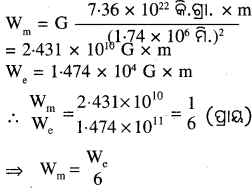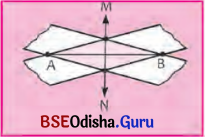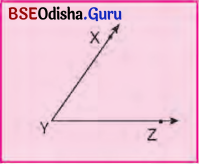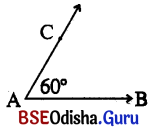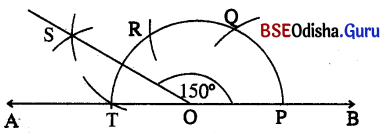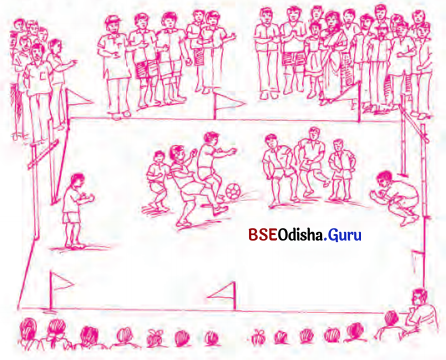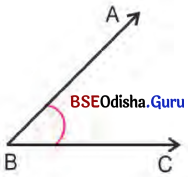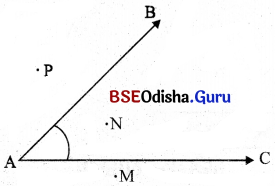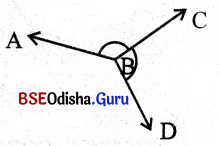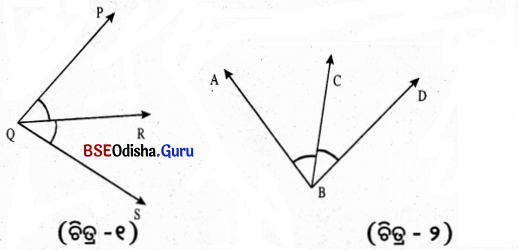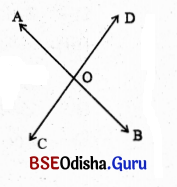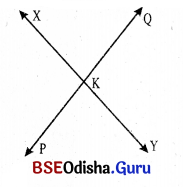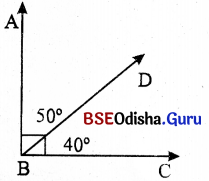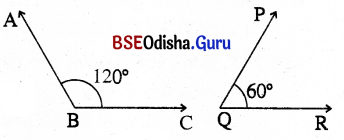Odisha State Board BSE Odisha 8th Class Odia Solutions Chapter 1 ବୃକ୍ଷ ମାହାତ୍ମ୍ୟ Textbook Exercise Questions and Answers.
BSE Odisha Class 8 Odia Solutions Chapter 1 ବୃକ୍ଷ ମାହାତ୍ମ୍ୟ
ପାଠ୍ୟପୁସ୍ତକସ୍ଥ ଅଭ୍ୟାସ କାର୍ଯ୍ୟର ଉତ୍ତର
Question ୧।
ଆସ, କଥାବାର୍ତ୍ତା ହେବା ।
(କ) ଓଡ଼ିଆ ଭାଗବତର ରଚୟିତା କିଏ ?
Answer:
ଓଡ଼ିଆ ଭାଗବତର ରଚୟିତା ଜଗନ୍ନାଥ ଦାସ ।
(ଖ) କବି ଜଗନ୍ନାଥ ଦାସ କେଉଁ ଶତାବ୍ଦୀରେ ଜନ୍ମଗ୍ରହଣ କରିଥିଲେ ?
Answer:
କବି ଜଗନ୍ନାଥ ଦାସ ପଞ୍ଚଦଶ ଶତାବ୍ଦୀରେ ଶେଷାର୍ଦ୍ଧରେ ଜନ୍ମଗ୍ରହଣ କରିଥିଲେ ।
(ଗ) ଓଡ଼ିଆ ଭାଗବତର କେଉଁ ସ୍କନ୍ଧରୁ ‘ବୃକ୍ଷ ମାହାତ୍ମ୍ୟ’ କବିତାଟି ଅଣାଯାଇଛି ?
Answer:
ଓଡ଼ିଆ ଭାଗବତର ଦଶମ ସ୍କନ୍ଧ (ଗୋପଲୀଳା) ଅନ୍ତର୍ଗତ ତ୍ରୟୋବିଂଶ ଅଧ୍ୟାୟରୁ ‘ବୃକ୍ଷ ମାହାତ୍ମ୍ୟ’ କବିତାଟି ଅଣାଯାଇଛି ।
(ଘ) କେଉଁମାନଙ୍କ ଆଗରେ ଶ୍ରୀକୃଷ୍ଣ ବୃକ୍ଷର ମହିମା କଥା କହୁଥିଲେ ?
Answer:
ଗୋପାଳ ଚାଳକମାନଙ୍କ ଆଗରେ ଶ୍ରାକୃଷ୍ଣ ବୃକ୍ଷର ମହିମା କଥା କହ୍ନଥ୍ଲେ।
(ଙ) ଯମୁନା ବିଷୟରେ କ’ଣ କୁହାଯାଇଛି ?
Answer:
ଯମୁନାର ଶୀତଳ ଜଳ ନରହରି ପାନ କଲେ ବୋଲି କୁହାଯାଇଛି ।
![]()
Question ୨।
ଆସ, ଦୁଇ ବା ତିନୋଟି ବାକ୍ୟରେ ତଳ ପ୍ରଶ୍ନର ଉତ୍ତର ଲେଖିବା ।
(କ) ଶ୍ରୀକୃଷ୍ଣଙ୍କ ନାମ ‘ଦାମୋଦର’ ହୋଇଛି; ଏହାର କାରଣ କ’ଣ ?
Answer:
‘ଦାମ’ ଶବ୍ଦର ଅର୍ଥ ଦଉଡ଼ି । ପିଲାଦିନେ ଅମାନିଆ ଶ୍ରୀକୃଷ୍ଣଙ୍କୁ ମାତା ଯଶୋଦା ଥରେ ଦଉଡ଼ିରେ ବାନ୍ଧିଥିଲେ । ଶ୍ରୀକୃଷ୍ଣଙ୍କ ଶରୀରରେ ସେହି ଦଉଡ଼ିର ଚିହ୍ନ ରହିଯାଇଥିଲା । ସେହି କାରଣରୁ ଶ୍ରୀକୃଷ୍ଣଙ୍କର ଅନ୍ୟ ନାମ ହେଉଛି ଦାମୋଦର ।
(ଖ) ଗୋପବାଳକମାନେ ଦୁଃଖ ଅନୁଭବ କରୁଥୁଲେ କାହିଁକି ?
Answer:
ଗୋପାଳ ବାଳକମାନେ ବନରେ ଧେନୁ ଚରାଉଥିଲେ । ମଧ୍ୟାହ୍ନ ସମୟର ସୂର୍ଯ୍ୟକିରଣର ଅସହ୍ଯ ତେଜ ଶରୀରରେ ଲାଗିବାରୁ ସେମାନେ ଦୁଃଖ ଅନୁଭବ କରିଥିଲେ ।
(ଗ) ବୃକ୍ଷକୁ ସୁଜନଙ୍କ ସହିତ ତୁଳନା କରାଯିବାର କାରଣ କ’ଣ ?
Answer:
ସୁଜନ ବା ଭଲ ମଣିଷ ନିକଟକୁ ଯାଇଥିବା ଅତିଥିକୁ ସେ ଯେପରି ନିରାଶ ନକରି ଉପଯୁକ୍ତ ଆତିଥ୍ୟ ପ୍ରଦାନ କରିଥାଏ, ଠିକ୍ ସେହିପରି ବୃକ୍ଷ ନିକଟକୁ ଯାଇଥବା ପ୍ରାଣୀକୁ ବୃକ୍ଷ ତା’ର ପତ୍ର, ଫୁଲ, ଫଳ, ଛାଇ, ମୂଳ, ବକଳ ଓ ଦାରୁ ଦେଇ ସନ୍ତୁଷ୍ଟ କରିଥାଏ । ତେଣୁ କବି ବୃକ୍ଷକୁ ସୁଜନ ବା ଭଲ ମଣିଷଙ୍କ ସହିତ ତୁଳନା
(ଘ) ‘ଜୀବିକା ହୋନ୍ତି ପ୍ରାଣୀଙ୍କର’– ଏହି ଧାଡ଼ିରୁ ବୃକ୍ଷ ସମ୍ପର୍କରେ ତୁମେ କ’ଣ ଜାଣିବାକୁ ପାଉଛ ?
Answer:
‘ଜୀବିକା ହୋନ୍ତି ପ୍ରାଣୀଙ୍କର’ – ଏହି ଧାଡ଼ିରୁ ବୃକ୍ଷର ଉପକାରିତା ସମ୍ପର୍କରେ ଆମେ ଜାଣିବାକୁ ପାଉଛୁ । ବୃକ୍ଷ ଖରା, ବର୍ଷା, ଶୀତ ସହି ମଧ୍ଯ ପ୍ରାଣୀଙ୍କର ଉପକାରରେ ନିଜକୁ ନିୟୋଜିତ କରିଥାଏ ଓ ଜୀବନ ଧାରଣର ମାଧ୍ୟମ ହୋଇଥାଏ ।
(ଙ) କେଉଁ ସ୍ଥାନକୁ ଗଲେ ଅତିଥିଙ୍କୁ ନିରାଶ ହେବାକୁ ପଡ଼େନାହିଁ ?
Answer:
ସୁଜନ ବା ଭଲ ମଣିଷଙ୍କ ଘରକୁ ଗଲେ ଅତିଥିଙ୍କୁ ନିରାଶ ହେବାକୁ ପଡ଼େନାହିଁ ।
Question ୩ ।
ଆସ, ୧୦୦ରୁ ୧୨୦ ଶବ୍ଦ ମଧ୍ଯରେ ତଳ ପ୍ରଶ୍ନଗୁଡିକର ଉତ୍ତର ଲେଖୁ ।
(କ) ବୃକ୍ଷମାନଙ୍କ ଜୀବନ ଧନ୍ୟ – କବି ଏପରି କାହିଁକି କହିଛନ୍ତି?
ଷୋଡ଼ଶ ଶତାବ୍ଦାର ଭକ୍ଳାୟ କାବ୍ୟ ୟୁଗକୁ ଭକ୍ତିରସର ଧର୍ମଧାରାରେ ପ୍ଲାବିତ କରି ଉକ୍କର ଜନଜାବନରେ ବୈଷ୍ଣବୀୟ ଚେତନା ଭରି ଦେଇଥିବା ସାରସ୍ଵତ ସାଧକଗଣଙ୍କ ମଧ୍ୟରେ ଭକ୍ତକବି ଜଗନ୍ନାଥ ଦାସ ଅଗ୍ରଗଣ୍ୟ । ଓଡ଼ିଶାର ପୁରପଲ୍ଲୀରେ ତାଙ୍କ ରଚିତ ‘ଭାଗବତ’ ଅତି ପରିଚିତ ଓ ଉପାଦେୟ ଗ୍ରନ୍ଥ ଭାବରେ ସ୍ଵୀକୃତ। ଆଲୋଚ୍ୟ କବିତା ‘ବୃକ୍ଷ ମାହାତ୍ମ୍ୟ’ କବିଙ୍କ ‘ଭାଗବତ’ର ଦଶମ ସ୍କନ୍ଧ (ଗୋପଲୀଳା) ଅନ୍ତର୍ଗତ ତ୍ରୟୋବିଂଶ ଅଧ୍ୟାୟରୁ ଅଣାଯାଇଛି । ଏଥିରେ କବି କୃଷ୍ଣଙ୍କର ମାନବୀୟ ଲୀଳା ବର୍ଣ୍ଣନା କରିବା ସଙ୍ଗେ ସଙ୍ଗେ ତାଙ୍କ ମାଧ୍ୟମରେ ବୃକ୍ଷର ମାହାତ୍ମ୍ୟ ବର୍ଣ୍ଣନା କରିଛନ୍ତି ।
ବାସ୍ତବରେ କବି ବୃକ୍ଷର ମାହାତ୍ମ୍ୟ ଦର୍ଶାଇବାକୁ ଯାଇ ତାହାକୁ ସୁପୁରୁଷ ବା ସାଧୁମାନଙ୍କ ସହିତ ତୁଳନା କରିଛନ୍ତି । ନିଦାଘ କ୍ଳାନ୍ତିରୁ ମୁକ୍ତି ପାଇବାପାଇଁ କୃଷ୍ଣ ଗୋପବାଳକମାନଙ୍କ ସହିତ ବୃକ୍ଷର ଛାୟାରେ ବସିଛନ୍ତି । ବୃକ୍ଷର ସୁଶୀତଳ ଛାୟାରେ ସେ ଆନନ୍ଦ ଅନୁଭବ କରିଛନ୍ତି । ତାଙ୍କ ମନରେ ସ୍ୱାଭାବିକ ଭାବେ ବୃକ୍ଷ ପ୍ରତି ଆନୁଗତ୍ୟ ଭାବ ଆସିଛି । ବୃକ୍ଷର ମହିମା ବର୍ଣ୍ଣନାରେ ସେ ଶତମୁଖ ହୋଇଛନ୍ତି ।
ବୃକ୍ଷର ମହିମା ବର୍ଣ୍ଣନା କରି ପ୍ରଥମେ ସେ ବୃକ୍ଷକୁ ସୁଜନ ପ୍ରାଣୀଙ୍କ ସହିତ ତୁଳନା କରିଛନ୍ତି । କାରଣ ସାଧୁଲୋକ ନିଜେ କଷ୍ଟ ସହିଲେ ମଧ୍ୟ ଅନ୍ୟ କାହାକୁ କଷ୍ଟ ଦେବାକୁ ଚାହେଁ ନାହିଁ । ସେ ସବୁବେଳେ ଅନ୍ୟର ମଙ୍ଗଳ ଆଶାୟୀ ହୋଇ ରହିଥାଏ । ସେହିପରି ବୃକ୍ଷ ପ୍ରକୃତିଜନିତ ସବୁକିଛି ଦୁଃଖ ସହିଲେ ମଧ୍ୟ ତାହାର ଆଶ୍ରିତ ପ୍ରାଣୀଙ୍କୁ କେବେହେଲେ ଦୁଃଖ ଦେବାକୁ ଚାହେଁ ନାହିଁ । ସେ ଶୀତ, ବର୍ଷା, ଖରା ଦୁଃଖ ସହି ଆମମାନଙ୍କୁ ସୁଖ ଦେଇଥାଏ ବୋଲି ଶ୍ରୀକୃଷ୍ଣ ସେମାନଙ୍କୁ କହିଛନ୍ତିା
ବୃକ୍ଷ କେବଳ ପ୍ରାଣୀଙ୍କର ସହାୟ ହୋଇନଥାଏ, ସେ ମଧ୍ଯ ସେମାନଙ୍କ ଜୀବନ ଜୀବିକାର ମାଧ୍ଯମ ହୋଇଥାଏ । ତା’ର ପତ୍ରକୁ ମଣିଷ ଔଷଧ ରୂପେ ବ୍ୟବହାର କରି ଦୁଃସାଧ୍ୟ ରୋଗ ଯନ୍ତ୍ରଣାରୁ ମୁକ୍ତି ପାଏ । ତା’ର ଫୁଲର ସୁବାସ ଓ ସୌନ୍ଦର୍ଯ୍ୟ ମଣିଷକୁ ବିମୋହିତ କରାଏ । ଫଳର ରସାଳ ରସରେ ମଣିଷ ନିଜର ଉଦରଜ୍ଵାଳାକୁ ପ୍ରଶମିତ କରେ । ଗଛର ମୂଳ ପାଇଁ ମୃତ୍ତିକା କ୍ଷୟ ହୋଇ ନଥାଏ ଏବଂ ଜଳସ୍ତର ନିମ୍ନଗାମୀ ହୋଇନଥାଏ । ଗଛର ଛେଲି, ଭସ୍ମ, ଅଠାକୁ ମଣିଷ ନିଜର ବ୍ୟବହାରରେ ଲଗାଇ ଅନେକ ସମସ୍ୟାରୁ ମୁକ୍ତି ପାଇଥାଏ। ବୃକ୍ଷ ମଣିଷର ବା ପ୍ରାଣୀଜଗତର ମଙ୍ଗଳ ପାଇଁ ନିଜକୁ ସମର୍ପିତ କରିଥିବାରୁ କବି ତା’ ଜୀବନ ଧନ୍ୟ ବୋଲି କହିଛନ୍ତି । କବିଙ୍କ ଭାଷାରେ-
“ଶାତ ବରଷ। ଘର୍ମ ଦୁଃଖ
ସହି ଆମ୍ଭଙ୍କୁ ଦ୍ୟନ୍ତି ସୁଖ ।
ଜୀବିକା ହୋନ୍ତି ପ୍ରାଣୀଙ୍କର ।’’
କାବିକା ହୋନ୍ତି ପ୍ରାଶାଙ୍କର”
(ଖ) ଅବିଚାରିତ ଭାବରେ ବୃକ୍ଷଛେଦନ ଫଳରେ ସମାଜରେ କି ପ୍ରକାର କ୍ଷତି ଘଟୁଛି ?
Answer:
ବୃକ୍ଷହିଁ ମଣିଷର ଜୀବନ ଜୀବିକା । ବୃକ୍ଷ ଯୋଗୁଁ ମଣିଷ ସମାଜ ତିଷ୍ଠି ରହିଛି । ଆଦିମାନବର ବାସସ୍ଥାନ ଥିଲା ବୃକ୍ଷତଳ ବା ଘନ ଅରଣ୍ୟ । ମଣିଷ ସଭ୍ୟତା ତଥା ସଂସ୍କୃତିର ବିକାଶରେ ବୃକ୍ଷର ଭୂମିକା ଗୁରୁତ୍ଵପୂର୍ଣ୍ଣ । ସଭ୍ୟତାର ବିକାଶ ପୂର୍ବରୁ ମଣିଷର ସବୁପ୍ରକାର ଆବଶ୍ୟକତା ବୃକ୍ଷହିଁ ପୂରଣ କରୁଥିଲା । ତା’ପାଇଁ ଖାଦ୍ୟ, ବସ୍ତ୍ର ଓ ବାସଗୃହର ଆବଶ୍ୟକତା ପରିପୂରଣରେ ବୃକ୍ଷହିଁ ଏକମାତ୍ର ସହାୟ ଥିଲା ।
ଆଜିକାଲି ଅବାରିତ ଓ ଅବିଚାରିତ ଭାବରେ ଯେପରି ବୃକ୍ଷଛେଦନ ହେଉଛି, ତାହାର କୁପ୍ରଭାବ ମଣିଷ ସମାଜ ଉପରେ ନିଶ୍ଚୟ ପଡ଼ିବ। ସେହି କୁପ୍ରଭାବରୁ ରକ୍ଷା ପାଇବା ମଣିଷପକ୍ଷେ ସମ୍ଭବ ନୁହେଁ । ଉତ୍ତର ଆଫ୍ରିକା, ପାରସ୍ୟ, ମିଶର ଆଦି ବହୁ ଦେଶ ବୃକ୍ଷ କ୍ଷୟ ହେତୁ ଶୁଷ୍କ ମରୁଭୂମିରେ ପରିଣତ ହୋଇଯାଇଛି । ଭାରତରେ ଅରଣ୍ୟ ସମ୍ପଦ କ୍ଷୟ ବା ବୃକ୍ଷଛେଦନ ସେହିପରି ବିପଦ ଟାଣି ଆଣିବାର ସମ୍ଭାବନା ରହିଛି । ୧୯୫୨ ମସିହାରେ ଭାରତରେ ଯେଉଁ ଜଙ୍ଗଲ ନୀତି ପ୍ରଣୟନ କରାଯାଇଥିଲା, ସେଥିରେ କୁହାଯାଇଥିଲା ଦେଶର ଏକ ତୃତୀୟାଂଶ ବୃକ୍ଷ ଆଚ୍ଛାଦିତ ହୋଇ ରହିବା ନିତାନ୍ତ ଆବଶ୍ୟକ। ମାତ୍ର ବାସ୍ତବ କ୍ଷେତ୍ରରେ ତାହା କାର୍ଯ୍ୟକାରୀ ହୋଇନାହିଁ । ପୁରୁଣା ଜଙ୍ଗଲସବୁ ନଷ୍ଟ ହେଉଛି, ଅଥଚ ନୂଆ ଜଙ୍ଗଲ ସୃଷ୍ଟି କରିବାର ପ୍ରଚେଷ୍ଟା ହେଉନାହିଁ । ଅବିଚାରିତ ବୃକ୍ଷ କ୍ଷୟ ହେତୁ ପ୍ରାକୃତିକ ବିପର୍ଯ୍ୟୟ ସୃଷ୍ଟି ହେଉଛି । ଠିକ୍ ସମୟରେ ବର୍ଷା ହେଉନାର୍ହିା ଅନିୟମିତ ବର୍ଷା ଯୋଗୁଁ ଫସତ୍ତର ପ୍ରଭୃତ କ୍ଷତିସାଧନ ହେଉଛି । ବାକ୍ଷୁମଣ୍ଡଳରେ ଅଧ୍କରୁ ଅଧିକ ଅଙ୍ଗାରକାମ୍ଳ
ବାଷ୍ପ ବୃଦ୍ଧି ପାଇ ମଣିଷ ସମାଜ ପ୍ରତି ବିପଦ ସୃଷ୍ଟି କରୁଛି । ସାଧାରଣତଃ ବୃକ୍ଷମାନେ ଏହି ବିଷାକ୍ତ ବାଷ୍ପକୁ ଶୋଷି ନେଇ ବିଶୁଦ୍ଧ ଅମ୍ଳଜାନ ଯୋଗାଇଥା’ନ୍ତି । ମାତ୍ର ଅତ୍ୟଧିକ ବୃକ୍ଷ କ୍ଷୟ ଯୋଗୁଁ ତାହା ସମ୍ଭବ ହେଉନାହିଁ । ଶିଳ୍ପ ତଥା ଗାଡ଼ିମଟରରୁ ନିର୍ଗତ ହେଉଥିବା ଦୂଷିତ ବାଷ୍ପ ପରିବେଶ ଉପରେ ପ୍ରତିକୂଳ ପ୍ରଭାବ ପକାଉଛି । ପରିବେଶ ଦୂଷିତ ହେଉଥିବାରୁ ପରିବେଶବିତ୍ମାନେ ଏଥିପାଇଁ ଉଦ୍ବେଗ ପ୍ରକାଶ କରୁଛନ୍ତି । ଯଦି ଏହିପରି ବୃକ୍ଷ ନଷ୍ଟ ହୋଇ ଚାଲେ, ତା’ହେଲେ ମାନବ ସମାଜର ସୁସ୍ଥ ଜୀବନଯାପନ ଅସମ୍ଭବ ହୋଇ ପଢ଼ିବା
ବୃକ୍ଷଛେଦନ ପାଇଁ ଆଜି ମଣିଷ ବିପଦର ଦ୍ଵାରଦେଶରେ ପହଞ୍ଚି ସାରିଛି । ମଣିଷକୁ ଆସନ୍ନ ବିପଦରୁ ରକ୍ଷା କରିବାକୁ ହେଲେ ନୂତନ ବୃକ୍ଷ ଲଗାଇ ଜଙ୍ଗଲ ସୃଷ୍ଟି କରିବାକୁ ହେବ । ପିଲାଠାରୁ ବୁଢ଼ା ପର୍ଯ୍ୟନ୍ତ ସହରଠାରୁ ପଲ୍ଲୀ ପର୍ଯ୍ୟନ୍ତ ସମସ୍ତେ ଯଦି ବୃକ୍ଷ ରୋପଣ କରି ତା’ର ଯତ୍ନ ନିଅନ୍ତି, ତା’ହେଲେ ପରବର୍ତ୍ତୀ ସମୟରେ ଆମକୁ ଆଉ ପଶ୍ଚାତ୍ତାପ କରିବାକୁ ପଡ଼ିବ ନାହିଁ ।
(ଗ) ବୃକ୍ଷମାନେ ପରର ଉପକାର କିପରି କରନ୍ତି ?
Answer:
ଉତ୍କଳର ଭକ୍ତିଯୁଗର କାବ୍ଯସାହିତ୍ୟ ଯେଉଁ ଆଧ୍ୟାତ୍ମିକ ଚେତନାସ୍ନାତ ସାରସ୍ଵତ ସାଧକମାନଙ୍କ ଅନନ୍ୟ ସୃଷ୍ଟି ସମ୍ଭାରରେ ଋଦ୍ଧିମନ୍ତ ସେମାନଙ୍କ ମଧ୍ୟରେ ଭକ୍ତକବି ଅତିବଡ଼ୀ ଜଗନ୍ନାଥ ଦାସଙ୍କ ନାମ ଅଗ୍ରଗଣ୍ୟ । ଉତ୍କଳର ଗଣଚେତନାକୁ ନୀତିନିଷ୍ଠ, ମାନବପ୍ରେମୀ ଓ ଆଧ୍ୟାତ୍ମିକ ଚେତନାଶ୍ରୟୀ କରିବା ନିମନ୍ତେ ଭକ୍ତି, ପ୍ରେମ ଓ ସମର୍ପଣର କାବ୍ୟ ‘ଓଡ଼ିଆ ଭାଗବତ’ ତାଙ୍କ ଲେଖନୀରୁ ନିଃସୃତ ହୋଇଥିଲା ।
ଶ୍ରୀକୃଷ୍ଣ ଗୋପାଳ ବାଳକମାନଙ୍କ ଗହଣରେ ଧେନୁ ଚରାଇବାକୁ ଯାଇଛନ୍ତି । କ୍ରମଶଃ ଦିନର ବୟଃ ବୃଦ୍ଧି ସଙ୍ଗେ ସଙ୍ଗେ ସୂର୍ଯ୍ୟକିରଣର ତାପ ପ୍ରବଳରୁ ପ୍ରବଳତର ହୋଇଛି । ସୂର୍ଯ୍ୟତାପ ସହି ନପାରି ସେମାନେ ବୃକ୍ଷମୂଳରେ ବିଶ୍ରାମ ନେଇଛନ୍ତି । ବୃକ୍ଷର ସୁଶୀତଳ ଛାୟା ସେମାନଙ୍କୁ ଆମୋଦିତ ଓ ଆନନ୍ଦିତ କରିଛି । ତେଣୁ ଲୀଳାସୁନ୍ଦର ଶ୍ରୀକୃଷ୍ଣ ବୃକ୍ଷ ପ୍ରତି ତାଙ୍କର ଆନୁଗତ୍ୟ ଜଣାଇଛନ୍ତି । ତା’ର ଉପକାର ବର୍ଣ୍ଣନାରେ ସେ ଶତମୁଖ ହୋଇ ଉଠିଛନ୍ତି । ଗୋପାଳ ବାଳକମାନଙ୍କ ଆଗରେ ସେ ବୃକ୍ଷର ମହିମା ବଖାଣିଛନ୍ତି ।
ବୃକ୍ଷ ତା’ର ସୁଶୀତଳ ଛାୟା ପ୍ରଦାନ କରି କ୍ଳାନ୍ତ ମଣିଷ ବା ପ୍ରାଣୀଙ୍କର ଉପକାର କରିଥାଏ । ନିଜେ ଖରା ସହି ପତ୍ରକୁ ଏଭଳି ସଜାଇ ରଖେ ଯେ ତା’ଛାୟାରେ ବସିଥିବା କ୍ଳାନ୍ତ ମଣିଷର ସବୁକିଛି କ୍ଳାନ୍ତି ଦୂରେଇଯାଏ । କେବଳ ଖରା ନୁହେଁ, ସେ ମଧ୍ୟ ବର୍ଷା ଓ ଶୀତ ସହ୍ୟକରି ପରର ଉପକାର କରିଥାଏ ।
ବୃକ୍ଷର ପ୍ରତ୍ୟେକ ଅଂଶ ମଣିଷ କାହିଁକି, ସମଗ୍ର ପ୍ରାଣୀଜଗତଙ୍କର ବଞ୍ଚିବାରେ ସହାୟକ ହୋଇଥାଏ । ପତ୍ର ଛାଇ ଦେବା ସହିତ ଔଷଧ ଭାବେ ମଧ୍ୟ ବ୍ୟବହୃତ ହୁଏ । ଅନେକ ସମୟରେ ତା’ର ଔଷଧୀୟ ଗୁଣ ପ୍ରାଣୀଙ୍କୁ ରୋଗମୁକ୍ତ କରେ । ତୃଣଭୋଜୀ ପ୍ରାଣୀମାନେ ବୃକ୍ଷର ପତ୍ର ଖାଇ ସେମାନଙ୍କର ଉଦର ପୂରଣ କରିଥା’ନ୍ତି । ସେହିପରି ଫୁଲ ଗଛର ଶୋଭାବର୍ଦ୍ଧନ କରିବା ସହିତ ପ୍ରକୃତିକୁ ମନୋରମ କରିବାରେ ସହାୟକ ହୋଇଥାଏ । କେତେକ ଫୁଲର ମଧ୍ୟ ଔଷଧୀୟ ଗୁଣ ଥାଏ । ସେହି ଫୁଲ ଦିନେ ଫଳରେ ରୂପାନ୍ତରିତ ହୁଏ । ସେହି ଫଳକୁ ପ୍ରାଣୀମାନେ ସେମାନଙ୍କର ଖାଦ୍ୟ ରୂପେ ବ୍ୟବହାର କରିଥା’ନ୍ତି । ମୂଳରେ ଥିବା ଚେର ମୃଭିକାକୁ ରକ୍ଷା କରିଥାଏ । ବୃକ୍ଷର ଚେରପାଇଁ ହିଁ ମୃତ୍ତିକାର ଜଳ ଧାରଣ କରିବାର ଶକ୍ତି ବଢ଼ିଥାଏ।
ଗଛର ବକଳ ବା ଛେଲିକୁ କେତେକ ଔଷଧରୂପେ, କେହି କେହି କୌପୀନରୂପେ ବ୍ୟବହାର କରିଥା’ନ୍ତି । ତା’ର କାଠ ଘର ତିଆରି ଓ ଘରକରଣା ଜିନିଷ ତିଆରି କରିବାପାଇଁ ବ୍ୟବହାର ହୋଇଥାଏ । ଏତଦ୍ବ୍ୟତୀତ ତା’ର କ୍ଷାର, ଅଙ୍ଗାର, ଭସ୍ମ, ଅଠା ଆଦି ମଣିଷ ପାଇଁ ଉପାଦେୟ ହୋଇଥାଏ । ସବୁପ୍ରକାର ସେବା କରୁଥିବାରୁ ଓ ବୃକ୍ଷର ପ୍ରତ୍ୟେକ ଅଂଶ କାମରେ ଲାଗୁଥ୍ ବାରୁ ଶ୍ରାକୃଷ୍ଣ ତାହାକୁ ପରୋପକାରା ଭାବରେ ସମ୍ବୋଧନ କରିଛିନ୍ତି। ବାସ୍ତବିକ ପଞ୍ଚସଖା ଯୁଗର ଭକ୍ତକବି ଭକ୍ତିଭାବ ସୃଷ୍ଟି କରିବା ସହିତ କୃଷ୍ଣଙ୍କ ବକ୍ତବ୍ୟ ମାଧ୍ୟମରେ ଗଛର ଉପକାରିତା ଯେଭଳି ବୁଝାଇଛନ୍ତି, ତାହା ସର୍ବକାଳୀନ ଚିନ୍ତାଧାରା କହିଲେ ଅତ୍ୟୁକ୍ତି ହେବ ନାହିଁ ।
ଆସ, କବିତାର ପଦ ପୂରଣ କରିବା।
(କ) କ୍ଷାର, ଅଙ୍ଗାର, ଭସ୍ମ, ଅଠା ।
…………………………….
(ଖ) ଧନ୍ୟ ଜୀବନ ଏହାଙ୍କର ।
……………………………
(ଗ) ପତ୍ର କୁସୁମ ଫଳ ଛାଇ ।
……………………………
(କ) କ୍ଷାର, ଅଙ୍ଗାର, ଭସ୍ମ, ଅଠା ।
Answer:
ଗ୍ରହକୁ ସାଜି ବାଡ କଣା ॥
(ଖ) ଧନ୍ୟ ଜୀବନ ଏହାଙ୍କର ।
Answer:
ଜାବିକା ହୋନ୍ତି ପ୍ରାଣାଙ୍କର ॥
(ଗ) ପତ୍ର କୁସୁମ ଫଳ ଛାଇ ।
Answer:
ମୂଳ ବିକଳ ଦାରୁ ଦେଇ॥
![]()
Question ୪।
ଏହି କବିତାରୁ ଭଲ ଲାଗୁଥିବା ପଦଗୁଡିକ ନିର୍ବାଚନ କରି ଆବୃତ୍ତି କରିବା ?
Answer:
ପିଲାମାନେ ନିଜେ ଗାଇବେ ।
Question ୫।
ଆସ, ସରଳଭାଷାରେ ବୁଝାଇ ଲେଖୁବା :
(କ) ଏହାଙ୍କ ପ୍ରାୟେ ଯେବେ ହୋଇ
ସଂସାର ମଧେ ଦେହ ବହି ।
Answer:
ଏହାଙ୍କ ପ୍ରାୟେ ………………………… ଦେହ ବହି ।
ଶଂସିତ ପଦ୍ୟାଶଟି ଭକ୍ତକବି ଜଗନ୍ନାଥ ଦାସଙ୍କ ସର୍ବଶ୍ରେଷ୍ଠ ସାହିତ୍ୟକୃତି ‘ଓଡ଼ିଆ ଭାଗବତ’ର ଦଶମସ୍କନ୍ଧ (ଗୋପଲୀଳା) ଅନ୍ତର୍ଗତ ତ୍ରୟୋବିଂଶ ଅଧ୍ୟାୟର ‘ବୃକ୍ଷ ମାହାତ୍ମ୍ୟ’ କବିତାରୁ ଉଦ୍ଧୃତ । ଏଠାରେ କବି ବୃକ୍ଷର ଉପକାରୀ ସ୍ଵଭାବ ସମ୍ପର୍କରେ ବିଶଦ ବର୍ଣନା କରିଛନ୍ତି ।
କୃଷ୍ଣ ଗୋପାଳ ବାଳକମାନଙ୍କ ସହିତ ଧେନୁଚାରଣ ଉଦ୍ଦେଶ୍ୟରେ ଜନବସତିଠାରୁ ଦୂରକୁ ଯାଇଛନ୍ତି । ଧେନୁମାନଙ୍କୁ ଚାରଣଭୂମିରେ ଛାଡ଼ିଦେଇ ସେ ସାଥୀମାନଙ୍କ ସହିତ ବିଭିନ୍ନ ପ୍ରକାର କ୍ରୀଡ଼ା କୌତୁକ କରିଛନ୍ତି । କ୍ରମେ କ୍ରମେ ଦିନ ବଢ଼ି ବଢ଼ି ମଧ୍ୟାହ୍ନ ହୋଇଛି । ସୂର୍ଯ୍ୟ ମୁଣ୍ଡ ଉପରକୁ ଯିବାରୁ ସୂର୍ଯ୍ୟକିରଣ ଅସହ୍ୟ ହୋଇଛି । ଅସହ୍ୟ କିରଣରୁ ରକ୍ଷା ପାଇବାପାଇଁ କୃଷ୍ଣ ବୃକ୍ଷର ସୁଶୀତଳ ଛାୟାତଳେ ଆଶ୍ରୟ ନେଇଛନ୍ତି । ଅନ୍ୟ ସଖାମାନଙ୍କୁ ସେହି ଶୀତଳ ସ୍ଥାନକୁ ଆସିବାପାଇଁ ଆହ୍ୱାନ କରିଛନ୍ତି ।
କୃଷ୍ଣ ଥିଲେ ଲୀଳାସୁନ୍ଦର । ସେ ତାଙ୍କର ମାନବୀୟ ଲୀଳା ପ୍ରଦର୍ଶନ କରିବା ଅବକାଶରେ ସମାଜର ବିଭିନ୍ନ ଦିଗକୁ ବିଚାର ଆଲୋଚନା କରିଛନ୍ତି । ଯେଉଁମାନେ ଉପକାରୀ ସେ ସେମାନଙ୍କର ମହତ୍ତ୍ଵ ଗାନ କରିଛନ୍ତି । ବୃକ୍ଷ ସାଧାରଣ ମଣିଷ ବିଚାରରେ ହେୟ ହେଲେହେଁ ସେ ତାହାର ମହତ୍ତ୍ବ ବିଚାର କରିଛନ୍ତି । ଶ୍ରୀକୃଷ୍ଣ ଗୋପାଳ ବାଳକମାନଙ୍କ ଆଗରେ ବୃକ୍ଷର ବିଶେଷତା ବଖାଣି ବସିଛନ୍ତି । ବୃକ୍ଷ ସଦା ପରୋପକାରୀ । ସେ କଷ୍ଟ ସହି ଅନ୍ୟକୁ ସୁଖ ଦିଏ । ଅନ୍ୟର ବଞ୍ଚିବାରେ ଓ ଚ୍ଚାବନଧାରଣ କରିବାରେ ସେ ସହାୟକ ହୁଏ। ବୃଷର ପ୍ରତ୍ୟେକ ଅଂଶକୁ ବ୍ୟବହାର କର ପ୍ରାଶାମାନେ ଜାବନ ଧାରଣ କରିଥା’ନ୍ତି । ବୃକ୍ଷର ପତ୍ର, ଫୁଲ, ଫଳ, ମୂଳ, ବକଳ ସବୁକିଛି ମଣିଷ ପାଇଁ ଉପାଦେୟ । ତେଣୁ ଶ୍ରୀକୃଷ୍ଣ ବୃକ୍ଷଙ୍କୁ ସୁଜନ ବା
ସାଧୁଲୋକଙ୍କ ସହିତ ତୁଳନା କରିଛନ୍ତି । ବୃକ୍ଷ ଧରାପୃଷ୍ଠରେ ଜନ୍ମ ନେଇ ଯେପରି ସମସ୍ତଙ୍କର ମଙ୍ଗଳ କରିଥାଏ, ସମସ୍ତଙ୍କୁ ସୁଖରେ ଓ ଜୀବନ ଧାରଣରେ ସହାୟକ ହୋଇଥାଏ, ସବୁ ପ୍ରାଣୀ ସେହିପରି ମନୋଭାବ ପ୍ରତିପୋଷଣ କରିବା ଉଚିତ । ବିଶ୍ୱସ୍ରଷ୍ଟା କେବଳ ଅନ୍ୟର ଉପକାର ପାଇଁ ମନୁଷ୍ୟ ବା ଶ୍ରେଷ୍ଠ ପ୍ରାଣୀଙ୍କୁ ଧରାପୃଷ୍ଠରେ ଜନ୍ମ ଦେଇଛନ୍ତି । ତେଣୁ ସଂସାରରେ ଜନ୍ମ ନେଇ, ଦେହଧାରଣ କରି ବୃକ୍ଷ ସଦୃଶ ମଙ୍ଗଳକାରୀ ହେବାକୁ ସେ ଉପଦେଶ ଦେଇଛନ୍ତି ।
(ଖ) ମନ ବଚନ ଧନେ କରି
ଯେ ହୋଏ ପର ଉପକାରୀ ।
ଦିନ ହରନ୍ତି ଦୁଃଖ ସୁଖେ
ସେ ଧନ୍ୟ ଇହପର ଲୋକେ ।
Answer:
ମନ ବଚନ ………………….. ପରଲୋକେ ।
ଉକ୍ତ ପଦ୍ୟାଶଟି ଭକ୍ତକବି ଜଗନ୍ନାଥ ଦାସଙ୍କ ସର୍ବଶ୍ରେଷ୍ଠ ସାହିତ୍ୟକୃତି ‘ଓଡ଼ିଆ ଭାଗବତ’ର ଦଶମସ୍କନ୍ଧ (ଗୋପଲୀଳା) ଅନ୍ତର୍ଗତ ତ୍ରୟୋବିଂଶ ଅଧ୍ୟାୟର ‘ବୃକ୍ଷ ମାହାତ୍ମ୍ୟ’ କବିତାରୁ ଉଦ୍ଧୃତ ହୋଇଛି । ଏଠାରେ କବି ଶ୍ରୀକୃଷ୍ଣଙ୍କ ମାଧ୍ୟମରେ ବୃକ୍ଷର ମହିିମା ଗାନ କରିବା ସହିତ ମହତ୍ ଜନଙ୍କର ଗୁଣାବଳା ଆଲୋଚନା କରିଛନ୍ତି।
ଶ୍ରୀକୃଷ୍ଣ ନିଜର ସାଥୀ ଗୋପାଳ ବାଳକମାନଙ୍କୁ ନେଇ ଧେନୁ ଚରାଇବା ପାଇଁ ଯାଇଛନ୍ତି । କ୍ରମଶଃ ମଧ୍ୟାହ୍ନ ସମୟ ଉପସ୍ଥିତ ହେବାରୁ ସୂର୍ଯ୍ୟଙ୍କର କିରଣ ଅସହ୍ୟ ହୋଇଛି । କୃଷ୍ଣ ସାଥୀମାନଙ୍କ ସହିତ ଗ୍ରୀଷ୍ମ ଦାଉରୁ ରକ୍ଷା ପାଇବାପାଇଁ ବୃକ୍ଷତଳକୁ ଯାଇଛନ୍ତି । ବୃକ୍ଷର ସୁଶୀତଳ ଛାୟାରେ ବସି ଆନନ୍ଦିତ ହୋଇଛନ୍ତି । ସେହି ଅବସରରେ ଶ୍ରୀକୃଷ୍ଣ ନିଜର ସଖାମାନଙ୍କୁ ସମ୍ବୋଧନ କରି ବୃକ୍ଷର ବିଶେଷତା ବର୍ଣ୍ଣନା କରିଛନ୍ତି । ବୃକ୍ଷର ପ୍ରତ୍ୟେକ ଅଂଶ ଯେ ପ୍ରାଣୀ ଜଗତର ବଞ୍ଚିବାର କାରଣ ହୋଇଥାଏ, ତାହା ସେ ଉଲ୍ଲେଖ କରିଛନ୍ତି । ଏପରିକି ବୃକ୍ଷକୁ ମଧ୍ଯ ସେ ସାଧୁ ଲୋକ ବା ଉତ୍ତମ ଲୋକଙ୍କ ସହିତ ତୁଳନା କରିଛନ୍ତି ।
ଯେଉଁମାନେ ମହତ୍ ଲୋକ, ସେମାନେ ନିଜ ଅପେକ୍ଷା ଅନ୍ୟର ସୁଖକୁ ଅଧିକ ଗୁରୁତ୍ଵ ଦେଇଥା’ନ୍ତି । ସେମାନେ ଯେତେ କଷ୍ଟ ପାଇଲେ ମଧ୍ୟ ନିଜ ପାଇଁ ସେମାନେ ଅଧ୍ଵ ଚିନ୍ତା ନକରି ଅନ୍ୟର ମଙ୍ଗଳ ପାଇଁ ଇଚ୍ଛା କରିଥା’ନ୍ତି । ସେମାନେ କେବଳ ମନରେ ଯେ ଅନ୍ୟର ଉପକାର କରିବା ପାଇଁ ଇଚ୍ଛା କରିଥା’ନ୍ତି, ସେପରି ନୁହେଁ । ସେମାନେ ମଧ୍ଯ ମଧୁର ବଚନ କହି ଅନ୍ୟର ଦୁଃଖ ଦୂରେଇ ଦେବାପାଇଁ ଚେଷ୍ଟା କରିଥା’ନ୍ତି । କାରଣ ସହାନୁଭୂତିପୂର୍ଣ୍ଣ କଥା କେବଳ ମହତ୍ ଲୋକ ପାଖରୁ ହିଁ ମିଳିଥାଏ। ପୁନଶ୍ଚ ସେମାନେ ଶକ୍ତି ଅନୁସାରେ ଦୁଃଖୀଲୋକଙ୍କୁ ଧନ ଦେଇ ତା’ ମୁହଁରେ ହସ ଫୁଟାଇବାପାଇଁ ଚେଷ୍ଟା କରିଥା’ନ୍ତି ।
ଅର୍ଥାତ୍ ମନ, ବଚନ ଓ ଧନ ବଳରେ ସାଧୁଲୋକମାନେ ଜଗତର ମଙ୍ଗଳ କରିବାପାଇଁ ଇଚ୍ଛା କରିଥା’ନ୍ତି । ସାଂସାରିକ କ୍ଷେତ୍ରରେ ଜନ୍ମ ନେଇ ସେମାନେ ଦୁଃଖ ସୁଖ ଭୋଗକଲେ ମଧ୍ୟ ଅନ୍ୟକୁ ସାହାଯ୍ୟ ଓ ସେବା କରିଥିବାରୁ ସେମାନେ ପୁଣ୍ୟ ସଞ୍ଚୟ କରିଥା’ନ୍ତି । ଅନ୍ୟ ପାଇଁ ଜୀବନ ଦେଇ ଇହଜନ୍ମକୁ ସାର୍ଥକ କରିବା ସହିତ ପୁଣ୍ୟ ବଳରେ ପରଲୋକରେ ଆନନ୍ଦ ଅନୁଭବ କରିଥା’ନ୍ତି। କବି ଏଠାରେ ନିଜର ଦାର୍ଶନିକ ଚିନ୍ତାଧାରାକୁ କୃଷ୍ଣଙ୍କ ମାଧ୍ୟମରେ ପ୍ରକାଶ କରିଛନ୍ତି ।
![]()
Question ୬ ।
ତଳଲିଖୂତ ନାମମାନଙ୍କ ମଧ୍ୟରେ ଯେଉଁଗୁଡ଼ିକ ଶ୍ରୀକୃଷ୍ଣଙ୍କ ସଖାଙ୍କ ନାମ ନୁହେଁ, ତାହାକୁ ବାଛି ଲେଖ । ଶ୍ରୀଦାମ, ସୁବଳ, ଭୀମ, ଅର୍ଜୁନ, ପ୍ରାଶୁ, ଅଂଶୁ, ବଜ୍ରହସ୍ତ, ଦେବପ୍ରସ୍ଥ ।
Answer:
ଭୀମ, ପ୍ରାଶ୍ରୁ, ବଜ୍ରହସ୍ତ ।
Question ୭।
ତଳେ ଦିଆଯାଇଥିବା ଶବ୍ଦଗୁଡ଼ିକର ଅର୍ଥ ସେମାନଙ୍କ ଡାହାଣ’ ପଟରେ ଥିବା ବନ୍ଧନୀ ମଧ୍ଯରୁ ବାଛି ଲେଖ ।
(କ) ଘର୍ମ (ବର୍ଷା, ଝାଳ, ଲାଳ, ଚମଡ଼ା)
(ଖ) ଦାରୁ (ସୁନ୍ଦର, କର୍କଶ, ମଠ, କାଠ)
(ଗ) ଦ୍ୟନ୍ତି (ଥୁଅଛି, କୁହନ୍ତି, ନିଅନ୍ତି, ଦିଅନ୍ତି)
Answer:
(କ) ଘର୍ମ – ଝାଳ
(ଖ) ଦାରୁ – କାଠ
(ଗ) ବ୍ୟକ୍ତି – ଦିଅନ୍ତି
ଆସ, ନୂତନ ଶବ୍ଦ ଲେଖୁବା :
Question ୮।
‘ମହତ୍’ ଶବ୍ଦରେ ‘ତ୍ଵ’ ପ୍ରତ୍ୟୟ ଯୋଗ କଲେ ଶବ୍ଦଟି ହୁଏ ‘ମହତ୍ତ୍ବ’ । ସେହିପରି ନିମ୍ନଲିଖ୍ ଶବ୍ଦମାନଙ୍କରେ ‘ତ୍ୱ’ ପ୍ରତ୍ୟୟ ଯୋଗ କରି ନୂତନ ଶବ୍ଦଗୁଡ଼ିକୁ ଲେଖୁବା ।
ଗୁରୁ, ବିଶେଷ, ସତ୍, କ୍ଷୁଦ୍ର, ଦୂର, ସ୍ୱ
Answer:
ଗୁରୁ + ତ୍ବ = ଗୁରୁତ୍ୱ
ସତ୍ + ତ୍ବ = ସତ୍ତ୍ଵେ
ଦୂର + ତ୍ଵ = ଦୂରତ୍ବ
ବିଶେଷ + ତ୍ଵ = ବିଶେଷତ୍ଵ
କ୍ଷୁଦ୍ର + ତ୍ଵ = କ୍ଷୁଦ୍ରତ୍ୱ
ସ୍ବ + ତ୍ବ = ସ୍ଵତ୍ଵ
Question ୯।
ବନ୍ଧନୀ ମଧ୍ୟରୁ ଠିକ୍ ଶବ୍ଦ ବାଛି ପଦ ପୂରଣ କରିବା ।
(କ) ମନ ବଚନ ………………..କରି
ଯେ ହୋଏ ………………….. ଉପକାରା ।
(ଏକ, ନିଜ, ଧନେ, ବନେ, ସର୍ବ, ଜନେ, ପର, ତୋର )
(ଖ) ଶୀତ ବରଷା ……………….. ଦୁଃଖ
ସହି ……………………. ଦ୍ୟନ୍ତି ସୁଖ ।
(କର୍ମ, ମର୍ମ, ତୁମ୍ଭଙ୍କୁ, ଆମ୍ଭଙ୍କୁ, ଘର୍ମ, ସଭିଙ୍କୁ)
Answer:
(କ) ମନ ବଚନ ଧନେ କରି
ଯେ ହୋଏ ପର ଉପକାରୀ ।
(ଖ) ଶୀତ ବରଷା ……………….. ଦୁଃଖ
ସହି ଆମ୍ଭଙ୍କୁ ଦ୍ୟନ୍ତି ସୁଖ ।
Question ୧୦ ।
ନିମ୍ନଲିଖତ ଶବ୍ଦଗୁଡ଼ିକର ଅର୍ଥ ପାଖ କୋଠରିରେ ଲେଖ ।
(କ) ନିଦାଘ ରବି ତେଜ ଲାଗି
ଝୁରୁଛି ମୁହିଁ ପୁତ୍ର ଲାଗି ।
(ଖ) ମିଳିଲେ ଯମୁନାର ଲାଗେ
ସତ୍ତ୍ୱେ ଧନ କର୍ମେ ଲାଗେ ।
Answer:
(କ) ନିଦାଘ ରବି ତେଜ ଲାଗି – ‘ଲାଗି’ ଅର୍ଥ ସ୍ପର୍ଶରେ ଆସିବାରୁ
ଝୁରୁଛି ମୁହିଁ ପୁତ୍ର ଲାଗି – ‘ଲାଗି’ ଅର୍ଥ ପାଇଁ ନିମିତ୍ତ ।
(ଖ) ମିଳିଲେ ଯମୁନାର ଲାଗେ – ‘ଲାଗେ’ ଅର୍ଥ ତଟଦେଶରେ / ତ୍କଳରେ
ସଞ୍ଚିତ ଧନ କର୍ମେ ଲାଗେ – ‘ଲାଗେ’ ଅର୍ଥ ବିନିଯୋଗ ହୋଇଥାଏ|ବ୍ୟବହୃତ ହୋଇଥାଏ ।
Question ୧୧ ।
ପ୍ରତିଶବ୍ଦ ଲେଖୁବା –
ରବି………………….., ବୃକ୍ଷ………………………., ପୁଷ୍ପ……………………….., ପଲ୍ଲବ……………………
Answer:
ରବି – ସୂର୍ଯ୍ୟ, ବୃକ୍ଷ – ଗଛ, ପୁଷ୍ପ – ଫୁଲ, ପଲ୍ଲବ – ପତ୍ର
Question ୧୨ ।
ତୁମପାଇଁ କାମ ।
(କ) ଓଡ଼ିଆ ଭାଗବତ ସମ୍ପର୍କରେ ତଥ୍ୟ ସଂଗ୍ରହ କରି ତୁମ ସାହିତ୍ୟ ଶିକ୍ଷକଙ୍କୁ ଦିଅ ।
(ଖ) ବୃକ୍ଷର ଉପକାରିତା ସମ୍ପର୍କରେ ଲେଖାଯାଇଥିବା ବିଭିନ୍ନ କବିତା, ପ୍ରବନ୍ଧ ଓ ପାଠ୍ୟ ପୁସ୍ତକରୁ ତଥ୍ୟ ସଂଗ୍ରହ କରି ଖାତାରେ ଲେଖୁ ରଖୁ ଓ ଶ୍ରେଣୀରେ ଆଲୋଚନା କର ।
ପରାକ୍ଷା ଉପଯେ।ଗା ଅତିରିକ୍ତ ପ୍ରଶ୍ନୋତ୍ତର
ନିର୍ଦ୍ଦିଷ୍ଟ ଉତ୍ତରମୂଳକ ପ୍ରଶ୍ନେ।ତ୍ତର:
Question ୧ ।
‘ଦାମ’ ଏବଂ ‘ଉଦର’, ଏ ଦୁଇ ଶବ୍ଦକୁ ସନ୍ଧି କରାଯାଇ ‘ଦାମୋଦର’ ଶବ୍ଦଟି ଗଠିତ ହୋଇଛି । ଶେଷକୁ ‘ଉଦର’ ଶବ୍ଦ ଥିବା ଆଉ ତିନି ବା ଚାରୋଟି ଶବ୍ଦ ଲେଖ । ଏମାନଙ୍କ ମଧ୍ୟରୁ କୌଣସି ଶବ୍ଦର ଅର୍ଥ ତୁମକୁ ଜଣା ନଥୁଲେ ଅଭିଧାନରୁ ଖୋଜି ତାହାର ଅର୍ଥ ଟିପି ରଖ ।
କାକୋଦର (କାକ + ଉଦର) – ସର୍ପ
କୃଶୋଦର (କୃଶ + ଉଦର) – କ୍ଷୀଣ କଟିଯୁକ୍ତ
ଲମ୍ବୋଦର (ଲମ୍ବ + ଉଦର) – ଗଣେଶ
କୃଶୋଦର ( କୃଶ + ତ୍ତଦର) – କ୍ଷାଶ କଟିଯୁକ୍ତ
Question ୨ ।
‘ବେଭାର’ ଶବ୍ଦର ଗଦ୍ୟରୂପ ହେଉଛି ‘ବ୍ୟବହାର’ । ନିମ୍ନଲିଖ୍ ଶବ୍ଦଗୁଡ଼ିକୁ ଗଦ୍ୟରେ କିପରି ଲେଖାଯିବ ?
ଦ୍ୟନ୍ତ, ପୋଏ, କନ୍ୟାଏ, ବୋଲନ୍ତି, ହୋନ୍ତି
| ପଦ୍ୟରୂପ | ମଦ୍ୟରୂପ |
| ବ୍ୟନ୍ତ୍ରି | ଦେଇଥା’ ନ୍ତି/ ଦି ଅନ୍ତି |
| ପୋଏ | ପୁଅମାନେ |
| କନ୍ୟାଏ | କନ୍ୟାମାନେ |
| ବୋଲନ୍ତି | ବୋଲିଥା’ନ୍ତି |
| ହୋନ୍ତି | ହୋଇଥା’ ନ୍ତି / ହ୍ ଅନ୍ତି |
ସଂକ୍ଷିପ୍ତ ଭରମୂଳକ ପ୍ରଶ୍ନୋତ୍ତର :
Question ୧ ।
‘ବୃକ୍ଷ ମାହାତ୍ମ୍ୟ’ କବିତାର କବି କିଏ ?
Answer:
ପଞ୍ଚସଖା ଯୁଗର ଅନ୍ୟତମ କବି ଜଗନ୍ନାଥ ଦାସ ‘ବୃକ୍ଷ ମାହାତ୍ମ୍ୟ’ କବିତାର କବି ଅଟନ୍ତି ।
![]()
Question ୨ ।
‘କନ୍ୟାଏ ଗଲେ ତୋଷ ହୋଇ’- କେଉଁମାନଙ୍କୁ ଏଠାରେ କନ୍ୟାଏ ବୋଲି କୁହାଯାଇଛି ?
Answer:
‘କନ୍ୟାଏ ଗଲେ ତୋଷ ହୋଇ’ – ଏଠାରେ ଗୋପବାଳାମାନଙ୍କୁ କନ୍ୟାଏ ବୋଲି କୁହାଯାଇଛି ।
Question ୩ ।
ଦାମୋଦର କିଏ ?
Answer:
ଦାମୋଦର ହେତ୍ତଛନ୍ତି ଲାଳାସୁନ୍ଦର ଶ୍ରାକୃଷ୍ଣା
Question ୪ ।
‘ବୃକ୍ଷ ମାହାତ୍ମ୍ୟ’ କବିତାରେ କେଉଁ ଋତୁର ଘଟଣା ବର୍ଣ୍ଣନା କରାଯାଇଛି ?
Answer:
‘ବୃକ୍ଷ ମାହାତ୍ମ୍ୟ’ କବିତାରେ ହେମନ୍ତ ଋତୁର ମଧ୍ୟାହ୍ନ ସମୟର ଘଟଣା ବର୍ଣ୍ଣନା କରାଯାଇଛି ।
Question ୫ ।
‘ପୋଏ ହୋଇଲେ ଦୁଃଖ ଭାଗୀ’– କେଉଁମାନେ ଦୁଃଖ ଅନୁଭବ କରିଥିଲେ ?
Answer:
ଶ୍ରୀକୃଷ୍ଣଙ୍କ ସହିତ ଗୋଚାରଣ କରୁଥିବା ଗୋପବାଳକମାନେ ଦୁଃଖ ଅନୁଭବ କରିଥିଲେ ।
Question ୬।
ସ୍ତୋକକୃଷ୍ଣ କିଏ ?
Answer:
ସ୍ତୋକକୃଷ୍ଣ ଶ୍ରୀକୃଷ୍ଣଙ୍କର ଅନ୍ୟତମ ସଖା ଯିଏ ଗୋଚାରଣ ସମୟରେ ତାଙ୍କ ସହିତ ବନକୁ ଯାଉଥିଲେ ।
Question ୭ ।
ଶ୍ରୀକୃଷ୍ଣ କେଉଁ ବିଷୟରେ ବର୍ଣ୍ଣନା କରୁଥିଲେ ?
Answer:
ଶ୍ରୀକୃଷ୍ଣ ବୃକ୍ଷର ମହତ୍ତ୍ଵ ବିଷୟରେ ବର୍ଣ୍ଣନା କରୁଥିଲେ ।
Question ୮।
‘ଧନ୍ୟ ଜୀବନ ଏହାଙ୍କର’– ଏଠାରେ କେଉଁମାନଙ୍କ ଜୀବନ ବିଷୟରେ କୁହାଯାଇଛି ?
Answer:
ବୃକ୍ଷମାନେ ସୁଜନ ପ୍ରାଣୀଙ୍କ ପରି ଶୀତ, ବର୍ଷା, ଖରା ଭଳି ଦୁଃଖ ସହି ମଧ୍ୟ ଆମକୁ ସୁଖ ଦେଇଥା’ନ୍ତି । ସେହି ବୃକ୍ଷମାନଙ୍କ ଜାଗନ ବିଷୟରେ ଏଠାରେ କୁହାଯାଇଛି।
Question ୯।
ଇହଲୋକ ଓ ପରଲୋକରେ କେଉଁମାନଙ୍କ ଜୀବନ ଧନ୍ୟ ହୁଏ ବୋଲି କବି କହିଛନ୍ତି ?
Answer:
ଯେଉଁମାନେ ସଂସାରରେ ମନ, ବଚନ ଓ ଧନ ଦେଇ ପରର ଉପକାର କରନ୍ତି, ଇହଲୋକ ଓ ପରଲୋକରେ ସେହିମାନେଙ୍କ ଜାବନ ଧନ୍ୟ ହୁଏ ଚୋଲ କବ କହିଛନ୍ତି।
Question ୧୦ ।
‘ବୃକ୍ଷ ମାହାତ୍ମ୍ୟ’ କବିତାରେ କାହାକୁ ରାମ ବୋଲି କୁହାଯାଇଛି ?
Answer:
‘ବୃକ୍ଷ ମାହାତ୍ମ୍ୟ’ କବିତାରେ ବଳରାମଙ୍କୁ ରାମ ବୋଲି କୁହାଯାଇଛି ।
![]()
Question ୧୧।
ଭକ୍ତକବି ଜଗନ୍ନାଥ କେବେ ଜନ୍ମଗ୍ରହଣ କରିଥିଲେ ? ତାଙ୍କର ଶ୍ରେଷ୍ଠ ଅବଦାନ କ’ଣ ?
Answer:
ଭକ୍ତକବି ଜଗନ୍ନାଥ ଦାସ ପଞ୍ଚଦଶ ଶତାବ୍ଦୀର ଶେଷାର୍ଦ୍ଧରେ ଜନ୍ମଗ୍ରହଣ କରିଥିଲେ। ‘ଓଡ଼ିଆ ଭାଗବତ’ ତାଙ୍କର ଶ୍ରେଷ୍ଠ
Question ୧୨।
କବି ଜଗନ୍ନାଥଙ୍କ ରଚିତ ‘ଭାଗବତ’ର କେଉଁ ସ୍କନ୍ଧ ଓ କେଉଁ ଅଧ୍ୟାୟରୁ ‘ବୃକ୍ଷ ମାହାତ୍ମ୍ୟ’ କବିତା ଆନୀତ ?
Answer:
କବି ଜଗନ୍ନାଥଙ୍କ ରଚିତ ଭାଗବତର ଦଶମ ସ୍କନ୍ଧ ଅନ୍ତର୍ଗତ ତ୍ରୟୋବିଂଶ ଅଧ୍ୟାୟରୁ ‘ବୃକ୍ଷ ମାହାତ୍ମ୍ୟ’ କବିତା ଆନୀତ ।
Question ୧୩ ।
ଗୋପବାଳକମାନେ କାହିଁକି ଦୁଃଖ ଅନୁଭବ କରୁଥିଲେ ?
Answer:
କ୍ରମେ ଦିନ ବଢ଼ି ମଧ୍ୟାହ୍ନ ଉପଗତ ହେବାରୁ ଗ୍ରୀଷ୍ମର ପ୍ରକୋପ ବଢ଼ିବାକୁ ଲାଗିଲା । ତେଣୁ ଅସହ୍ୟ ସୂର୍ଯ୍ୟ କିରଣକୁ ସହ୍ୟ କରିନପାରି ଗୋପବାଳକମାନେ ଦୁଃଖ ଅନୁଭବ କରିଥିଲେ ।
Question ୧୪ ।
ଶ୍ରୀକୃଷ୍ଣ କେଉଁମାନଙ୍କ ଆଗରେ ବୃକ୍ଷର କେଉଁ ମହତ୍ତ୍ବ ବିଷୟରେ କହିଛନ୍ତି ?
Answer:
ଗୋଚାରଣ କାଳରେ ଅସହ୍ୟ ଗ୍ରୀଷ୍ମତାପରୁ ରକ୍ଷାପାଇବା ପାଇଁ ଶ୍ରୀକୃଷ୍ଣ ସମସ୍ତ ଗୋପବାଳକମାନ ଙ୍କୁ ବୃକ୍ଷ ମୂଳକୁ ଡାକି ଛନ୍ତି । ସେଠାରେ ସେ ନିଜର ସଖାମାନଙ୍କ ଆଗରେ ବୃକ୍ଷର ପରୋପକାରୀ ଗୁଣ ବିଷୟରେ କହି ଛନ୍ତି ।
ସରଳ ଭାଷାରେ ବୁଝାଇ ଲେଖ :
Question ୧।
“ ଧନ୍ୟ ଜୀବନ ଏହାଙ୍କର
ଜୀବିକା ହୋନ୍ତି ପ୍ରାଣୀଙ୍କର ।”’
Answer:
ଧନ୍ୟ ଜାବନ ………………………….. ପ୍ରାଣୀଙ୍କର ।
ଶଂସିତ ପଦ୍ୟାଶଟି ଭକ୍ତକବି ଜଗନ୍ନାଥ ଦାସଙ୍କ ସର୍ବଶ୍ରେଷ୍ଠ ସାହିତ୍ୟକୃତି ‘ଓଡ଼ିଆ ଭାଗବତ’ର ଦଶମ ସ୍କନ୍ଧ (ଗୋପଲୀଳା) ଅନ୍ତର୍ଗତ ତ୍ରୟୋବିଂଶ ଅଧ୍ୟାୟର ‘ବୃକ୍ଷ ମାହାତ୍ମ୍ୟ’ କବିତାରୁ ଉଦ୍ଧୃତ ହୋଇଛି । ଏଠାରେ କବି ବୃକ୍ଷର ବିଶେଷତା ଓ ଉପକାରା ସ୍ୱଭାବ ପ୍ରସଙ୍ଗରେ ଆଲେ।ଚନା କରିଛନ୍ତି।
କୃଷ୍ଣ ଗୋପାଳ ବାଳକାମାନଙ୍କ ସହିତ ଧେନୁ ଚରାଇବାପାଇଁ ଚାରଣଭୂମିକୁ ଯାଇଛନ୍ତି। ଦୂର ଚାରଶଭୂମିରେ ଗାଈମାନଙ୍କୁ ଚରିବାପାଇଁ ଛାଡ଼ି ଦେଇଛନ୍ତି । କ୍ରମଶଃ ଦିନର ବୟସ ବଢ଼ି ମଧ୍ୟାହ୍ନ ସମୟ ହୋଇଛି । ସୂର୍ଯ୍ୟଙ୍କର ପ୍ରଚଣ୍ଡ କିରଣ ଶ୍ରୀକୃଷ୍ଣ ଓ ତାଙ୍କର ସଖାମାନଙ୍କ ପାଇଁ ଅସହ୍ୟ ହୋଇଛି । ସୂର୍ଯ୍ୟଙ୍କର ତାତି କିରଣରେ ସେମାନେ ଅତିଷ୍ଠ ହୋଇପଡ଼ିଛନ୍ତି ।
ବୃକ୍ଷତଳେ ବିଶ୍ରାମ ନେବା ଅବକାଶରେ ଶ୍ରୀକୃଷ୍ଣ ଗୋପାଳ ବାଳକମାନଙ୍କ ଆଗରେ ବୃକ୍ଷର ବିଶେଷ ଗୁଣ ବର୍ଣ୍ଣନା କରିଛନ୍ତି । ବୃକ୍ଷମାନେ ସଦା ପରୋପକାରୀ । ଅନ୍ୟକୁ ସାହାଯ୍ୟ କରିବାକୁ ଯାଇ ସେମାନେ ନିଜେ ବହୁ କଷ୍ଟ ଭୋଗ କରିଥା’ନ୍ତି । ବୃକ୍ଷକୁ ଶ୍ରୀକୃଷ୍ଣ ସାଧୁଲୋକଙ୍କ ସହିତ ତୁଳନା କରିଛନ୍ତି । ସାଧୁଲୋକଙ୍କୁ ଯେତେ କଷ୍ଟ ପଡ଼ିଲେ ମଧ୍ୟ ସେ କେବେହେଲେ ଅନ୍ୟର ଅମଙ୍ଗଳ କରନ୍ତି ନାହିଁ । ସେହିପରି ବୃକ୍ଷ ଖରା, ବର୍ଷା, ଶୀତ ସହିଲେ ମଧ୍ୟ ସଦାବେଳେ ଅନ୍ୟ ପାଇଁ ସୁଖର କାରଣ ହୋଇଥାଏ । ଏପରିକି ତାହାକୁ ହାଣୁଥିବା ବ୍ୟକ୍ତିକୁ ମଧ୍ୟ ସେ ଶୀତଳ ଛାୟା ପ୍ରଦାନ କରିଥାଏ । ସେ ପ୍ରାଣୀମାନଙ୍କ ଜୀବନଧାରଣର ମାଧ୍ୟମ ହୋଇଥାଏ ।
ବୃକ୍ଷର ଫଳକୁ ପ୍ରାଣୀମାନେ ଖାଦ୍ୟ ରୂପେ ଗ୍ରହଣ କରନ୍ତି । ପତ୍ରକୁ ଔଷଧ ରୂପେ ବ୍ୟବହାର କରନ୍ତି ଓ ବୃକ୍ଷର ସୁଶୀତଳ ଛାୟାତଳେ ବିଶ୍ରାମ କରନ୍ତି । ଘର କରିବାପାଇଁ ଏବଂ ଘରର ସାଜ ସରଞ୍ଜାମ ତିଆରି ପାଇଁ ଲୋକମାନେ ବୃକ୍ଷର କାଠଗଣ୍ଡିକୁ ବ୍ୟବହାର କରିଥା’ନ୍ତି । ସୁତରାଂ ବୃକ୍ଷ ସବୁ ପ୍ରାଣୀଙ୍କର ଜୀବନଧାରଣର ମାଧ୍ୟମ ହୋଇଥାଏ । କବି ଆଧ୍ୟାତ୍ମିକ ଚେତନା ସହିତ ପ୍ରକୃତିର ସୁରକ୍ଷା ପାଇଁ ଯେଭଳି ମନ୍ତବ୍ୟ ଦେଇଛନ୍ତି, ତାହା ଅତ୍ୟନ୍ତ ଯୁକ୍ତିଯୁକ୍ତ ମନେହୁଏ ।
Question ୨।
ସୁଜନ ପ୍ରାଣୀଙ୍କ ବେଭାର ।
ସୁଜନ ପ୍ରାଣାଙ୍କ ବେଭାରା
Answer:
ପରେ କରନ୍ତି ……………………. ବେଭାର।
ଭଲ୍ମିଖିତ ପଦ୍ୟାଟି ପଠିତ ସାହିତ୍ୟ ପୁସ୍ତକର “ବୃକ୍ଷ ମାହାମ୍ୟ” ଶାର୍ଷକ କବିତାଗୁ ସଂଗୃହାତା ଆଲୋଗ୍ୟ ପଦ୍ୟାଖରେ କବି ଜଗନ୍ନାଥ ଦାସ ବୃକ୍ଷରାଜିଙ୍କୁ ସୁମହତ୍ ପ୍ରାଶାମାନଙ୍କ ସଦୃଶ ପରୋପକାରା ବୋଲି ଶ୍ରୀକୃଷ୍ଣଙ୍କ ମୁଖରେ ବର୍ଣ୍ଣନା କରିଛନ୍ତି ।
ଶ୍ରୀକୃଷ୍ଣ ଗୋପବାଳକମାନଙ୍କ ସହିତ ଗୋଚାରଣ କରୁଥିବା ସମୟରେ ପ୍ରଚଣ୍ଡ ରୌଦ୍ରତାପରୁ କ୍ଷାନ୍ତ ହେବା ନିମିତ୍ତ ବୃକ୍ଷ ମୂଳରେ ଉପବେଶନକରି ବୃଷର ଶାତଳ ଛାୟା ଉପଲବ୍ ଧି କରୁଥିଲୋ ଇତ୍ୟବସରରେ ଶ୍ରାକୃତ୍ର ଗୋପବାଳକମାନଙ୍କୁ ବୃକ୍ଷର ମହତ୍ ଉଦ୍ଦେଶ୍ୟ ସଂପର୍କରେ ସୂଚନା ପ୍ରଦାନ କରିଥ୍ ଲୋ ସୁମହତ୍ ଜନସମୂହ ସ୍ୱଭାବତଃ ପରେ।ପକାରା ତାଦୃଶ ବୃକ୍ଷରାଜି “ ପରୋପକାରାୟ ସ୍ୱର୍ଗାୟ ”କୁ ପାଥେୟ କରି ନିଜ ଜୀବନକୁ ଧନ୍ୟ କରିଛନ୍ତି । ବାସ୍ତବିକ କବିଙ୍କ ମନ୍ତବ୍ୟ ବେଶ୍ ଯୁକ୍ତିଯୁକ୍ତ ମନେହୁଏ ।
ଦୀର୍ଘ ତ୍ତରମୂଳକ ପ୍ରଶ୍ନୋତ୍ତର:
Question ୧।
କବିତାଟିର ନାମ ‘ବୃକ୍ଷ ମାହାତ୍ମ୍ୟ’ ରଖାଯିବାର ଯଥାର୍ଥତା ଆଲୋଚନା କର ।
Answer:
‘ବୃକ୍ଷ ମାହାତ୍ମ୍ୟ’ କବିତାର କବି ପଞ୍ଚସଖା ଯୁଗର ଭକ୍ତକବି ଜଗନ୍ନାଥ ଦାସ । ଷୋଡ଼ଶ ଶତାବ୍ଦୀର ଉତ୍କଳୀୟ କାବ୍ୟଯୁଗକୁ ଭକ୍ତିରସର ଧର୍ମଧାରାରେ ସେ ପ୍ଲାବିତ କରିଥିଲେ । ସେ ଉତ୍କଳୀୟ ଜନଜୀବନକୁ ବୈଷ୍ଣବୀୟ ଚିନ୍ତା ଓ ଚେତନାରେ ତଲ୍ଲୀନ କରିଥିଲେ । ଆଲୋଚ୍ୟ କବିତାଟି କବିଙ୍କର ଶ୍ରେଷ୍ଠ ସାହିତ୍ୟକୃତି ‘ଓଡ଼ିଆ ଭାଗବତ’ ର ଦଶମ ସ୍କନ୍ଧ (ଗୋପଲୀଳା) ଅନ୍ତର୍ଗତ ତ୍ରୟୋବିଂଶ ଅଧ୍ୟାୟରେ ସଂଯୋଜିତ ହୋଇଛି । ଉକ୍ତ ଅଧ୍ୟାୟରେ ‘ବୃକ୍ଷ ମାହାତ୍ମ୍ୟ’ ନାମରେ କୌଣସି ନାମ ଉଲ୍ଲେଖ କରାଯାଇ ନାହିଁ । ଆଲୋଚ୍ୟ ଅଂଶଟିର ମୁଖ୍ୟ କଥାବସ୍ତୁ ଭାବରେ ବୃକ୍ଷର ଉପାଦେୟତାକୁ ଶ୍ରୀକୃଷ୍ଣଙ୍କ ମୁଖରେ କବି ପ୍ରକାଶ କରାଇଥିବାରୁ ଆଲୋଚ୍ୟ ପାଠ୍ୟଶଟିର ଏପରି ନାମକରଣ କରାଯାଇଛି । ଏଭଳି ନାମକରଣ କଥାବସ୍ତୁ ଅନୁଯାୟୀ ସାର୍ଥକ ହୋଇଛି ।
କୃଷ୍ଣ ଗୋପାଳ ବାଳକମାନଙ୍କ ସହିତ ଧେନୁ ଚରାଇବାକୁ ଚାରଣଭୂମିକୁ ଯାଇଛନ୍ତି । ସୂର୍ଯ୍ୟଙ୍କ ପ୍ରଖର କିରଣରୁ ରକ୍ଷା ବୃକ୍ଷତଳେ ନିଜ ପ୍ରିୟ ସଖାମାନଙ୍କ ସହ ବିଶ୍ରାମ ନେଇଛନ୍ତି । ବୃକ୍ଷର ଶୀତଳ ଛାୟାରେ ସେ ନିଜର କ୍ଳାନ୍ତି ମେଣ୍ଢାଇଛନ୍ତି । ନିଜର ସଖାମାନଙ୍କ ନିକଟରେ ସେ ବୃକ୍ଷର ମାହାତ୍ମ୍ୟ ବର୍ଣ୍ଣନା କରିଛନ୍ତି । କବିଙ୍କ ଭାଷାରେ
“ଚରାନ୍ତି ଗୋରୁ ଗୋପ ମେଳେ
ଶୀତଳ ଛାୟା ବୃକ୍ଷ ତଳେ ।
ବୃକ୍ଷକୁ ଚାର୍ହିଁ ଦାମେ।ଦର
ବୋଲନ୍ତି ଗୋପଙ୍କ ଆଗର ।’’
ବୃକ୍ଷର ମହତ୍ତ୍ବ ବର୍ଣନା କରିବାକୁ ଯାଇ ଶ୍ରୀକୃଷ୍ଣ କହିଛନ୍ତି ଯେ ବୃକ୍ଷମାନେ ସବୁସମୟରେ ପରର ଉପକାର କରିଥା’ନ୍ତି । ଖରା, ବର୍ଷା, ଶୀତ ସହି, ନିଜେ କଷ୍ଟ ଅନୁଭବ କରି ମଧ୍ୟ ସେ ଅନ୍ୟର ମଙ୍ଗଳ କରିଥାଏ । ତେଣୁ ଶ୍ରୀକୃଷ୍ଣ ବୃକ୍ଷର ଜୀବନକୁ ଧନ୍ୟ ଧନ୍ୟ କରିଛନ୍ତି । ବୃକ୍ଷ ମଧ୍ଯ ମଣିଷଙ୍କର ଜୀବନ ଜୀବିକାର କାରଣ ହୋଇଥାଏ । କୃଷ୍ଣ ବୃକ୍ଷକୁ ସାଧୁଲୋକ ସହିତ ତୁଳନା କରିଛନ୍ତି । ସାଧୁଲୋକ ଯେପରି ଅନ୍ୟର ଉପକାରରେ ନିଜକୁ ଉତ୍ସର୍ଗ କରେ, ଠିକ୍ ସେହିପରି ବୃକ୍ଷ ନିଜର ଡାଳ, ପତ୍ର, ଫୁଲ, ଫଳ, ବକଳ, କ୍ଷାର, ଅଙ୍ଗାର, ଅଠା ଦେଇ ସମସ୍ତଙ୍କ ଜୀବନ ଧାରଣରେ ସହାୟକ ହୋଇଥାଏ ।
ଏଠାରେ ଶ୍ରୀକୃଷ୍ଣ କେବଳ ଗୋଟିଏ ବୃକ୍ଷର ବିଶେଷତା ବର୍ଣ୍ଣନା ନକରି ସମଗ୍ର ବୃକ୍ଷଜଗତର ମହତ୍ତ୍ବ ପ୍ରତିପାଦନ କରିଛନ୍ତି । କରିଙ୍କ ଭାଷାରେ-
“ପତ୍ର କୁସୁମ ଫଳ ଛ।ଇ
ମୂଳ ବକଳ ଦାରୁ ଦେଇ ।
କ୍ଷୀର, ଅଙ୍ଗାର, ଭସ୍ମ, ଅଠା
ଗୃହକୁ ସାଢି ବାଡ଼ କଣ୍ଟା ।
ଏତେ ପ୍ରକାର ସେବା କରି
ନିତ୍ୟେ ଏ ପର ଉପକାରୀ ।’’
ଉକ୍ତ କାବ୍ୟଂଶରେ କେବଳ ବୃକ୍ଷର ବିଶେଷତା ବର୍ଣ୍ଣନା କରାଯାଇଥିବାରୁ କାବ୍ୟାଶଟିର ‘ବୃକ୍ଷ ମାହାତ୍ମ୍ୟ’ ନାମକରଣ ସାର୍ଥକ ମନେ ହୋଇଥାଏ ।
![]()
Question ୨।
ବୃକ୍ଷରୋପଣର ଆଚ୍ଶ୍ୟକତା ସମ୍ପର୍କରେ ଶ୍ରେଣାଗୃହରେ ଅଥବା ବିଦ୍ୟାଳୟରେ ହେବାକୁ ଥିବା ଆଲୋଚନା ସଭାରେ ଭାଗ ନେବା ନିମନ୍ତେ ତୁମ ବକ୍ତବ୍ୟର ଏକ ପ୍ରତିଲିପି ପ୍ରସ୍ତୁୁତ କରା
Answer:
(ପ୍ରଥମେ ବକ୍ତବ୍ୟ ବା ଆଲୋଚନାରେ ଭାଗନେବା ପୂର୍ବରୁ ଇଷ୍ଟଦେବଙ୍କୁ ସ୍ମରଣ କରିବ । ସେଠାକାର ପରିବେଶ ପ୍ରତି ନଜର ରଖୁ । ଗୁରୁଜନଙ୍କ ପ୍ରତି ଯଥାର୍ଥ ମର୍ଯ୍ୟାଦାଜନକ ସମ୍ବୋଧନ କରିବା ସହିତ ସାଥୀ ପିଲାମାନଙ୍କୁଆୟୋଜକଙ୍କୁ କୃତଜ୍ଞତା ଜଣାଇବ । ନିଜର ମତକୁ ସ୍ପଷ୍ଟ ଭାବରେ ଏବଂ ମୁଖ, ଆଖ୍ ଓ ହାତକୁ ଯଥାର୍ଥ ଭାବେ ଉପଯୋଗ କରି ଆଲୋଚନାର ବିଷୟକୁ ଅବତାରଣା କରିବ ।)
ମଣିଷ ଜୀବନ, ସମାଜ ଓ ସଭ୍ୟତା ସହିତ ବୃକ୍ଷର ସମନ୍ଵୟସ୍ଥଳୀ ଅରଣ୍ୟ ଅଙ୍ଗାଙ୍ଗୀଭାବେ ଜଡ଼ିତ । ନାନାପ୍ରକାର ବୃକ୍ଷଲତା ସମାକୀର୍ଣ୍ଣ ବିସ୍ତୃତ ବନଭୂମି ଏକଦା ଥିଲା ମାନବ ଜାତିର ଜନ୍ମଭୂମି ଓ କର୍ମଭୂମି । ଆଦିମ ମାନବ ବୃକ୍ଷଠାରୁ ନିଜ ଜୀବନଧାରଣର ସବୁକିଛି ଚିଜ ସଂଗ୍ରହ କରୁଥିଲା । ମୁନିଋଷିମାନେ ବୃକ୍ଷରୋପଣ କରି ଆଶ୍ରମ ପରିବେଶକୁ ଶାନ୍ତ, ସୁନ୍ଦର ଓ କମନୀୟ କରୁଥିଲେ । ମାତ୍ର ଯାନ୍ତ୍ରିକ ସଭ୍ୟତା ଅନେକ ବୃକ୍ଷକୁ ନଷ୍ଟ କରି ଶିଳ୍ପ, ବାସଗୃହ ଓ ସହର ନିର୍ମାଣ କଲା । ଜୀବନରେ ସେ ଅନେକ ଅର୍ଥ ରୋଜଗାର କଲା; ମାତ୍ର ତା’ ଜୀବନର ସରସତା ଅପସରି ଗଲା ।
ପ୍ରକୃତରେ ଉଭିଦ ନାହିଁ ତ ଜୀବନ ନାହିଁ । ମଣିଷ ପାଇଁ ଉଭିଦ ବା ବୃକ୍ଷ ହିଁ ପ୍ରକୃତ ଉତ୍ପାଦନକାରୀ । ମଣିଷ ତଥା ଅନ୍ୟାନ୍ୟ ଜୀବ କେବଳ ଖାଉଟି ଶ୍ରେଣୀ । ବୃକ୍ଷହୀନ ଜଗତ ଏକ ମୃତ ଜଗତ । ବୃକ୍ଷ ଉପରେ ନିର୍ଭର କରୁଥିବାରୁ ପ୍ରାଣୀ ବୃକ୍ଷ ବିନା କ୍ଷୁଧାର ଜ୍ୱାଳା ସହିନପାରି ମୃତ୍ୟୁବରଣ କରିବ । ବୃକ୍ଷ ହିଁ ମନୁଷ୍ୟର ପ୍ରକୃତ ବନ୍ଧୁ । ଉତ୍ତମ ମୃତ୍ତିକା, ନିର୍ମଳ ଜଳ ଓ ବିଶୁଦ୍ଧ ବାୟୁ କେବଳ ବୃକ୍ଷ ପରିବେଷ୍ଟିତ ଅରଣ୍ୟଦ୍ୱାରା ସମ୍ଭବ ହୋଇଥାଏ । ମନୁଷ୍ୟ ଜୀବନଧାରଣ ପାଇଁ ଏହି ତିନୋଟିର ନିତାନ୍ତ ଆବଶ୍ୟକତା ରହିଛି । ‘ବିଷ୍ଣୁପୁରାଣ’ରେ ଗୋଟିଏ ବୃକ୍ଷକୁ ଦଶଗୋଟି ପୁତ୍ର ସହିତ ତୁଳନା କରାଯାଇଛି । ବୃକ୍ଷର ଦଶଗୋଟି ଅବଦାନ ହେଉଛି- ଅମ୍ଳଜାନ, ଜଳ, ମୃତ୍ତିକା, ତାପ ବା ଶକ୍ତି, ଖାଦ୍ୟ, ବସ୍ତ୍ର, ଆଶ୍ରୟ, ଔଷଧ, ଜାଳେଣି ଦ୍ରବ୍ୟ ଓ ଛାୟା ।
ଯାଦୁକର ଶୂନ୍ୟରେ ପଦାର୍ଥ ତିଆରି କରିବାର ଛଳନା କରେ; ମାତ୍ର ଉଭିଦ ସତକୁ ସତ ଶୂନ୍ୟରୁ ଖାଦ୍ୟ ପଦାର୍ଥ ସୃଷ୍ଟିକରେ । ସୂର୍ଯ୍ୟକିରଣରୁ ଶକ୍ତି, ବାୟୁମଣ୍ଡଳରୁ ଅଙ୍ଗାରକାମ୍ଳ ଗ୍ୟାସ୍, ମାଟିରୁ ଜଳ ଓ ଖଣିଜ ଲବଣ ସଂଗ୍ରହ କରି ଉଭିଦ ପତ୍ରରେ ଖାଦ୍ୟ ପ୍ରସ୍ତୁତ କରେ ଓ ବିଶୁଦ୍ଧ ଅମ୍ଳଜାନ ଗ୍ୟାସ୍ ବାୟୁମଣ୍ଡଳକୁ ଛାଡ଼େ । ସେହି ଖାଦ୍ୟ ନିଜେ ଗ୍ରହଣ କରି ବଢ଼େ ଓ ବଳକାତକ ଖାଦ୍ୟ ଆକାରରେ ଫୁଲ ଫଳରେ ସଞ୍ଚୟ କରେ ଯାହାକୁ ଖାଇ ଜୀବଜଗତ ଜୀବନଧାରଣ କରନ୍ତି । ଅମ୍ଳଜାନ ହେଉଛି ପ୍ରାଣୀ ଜଗତର ପ୍ରାଣ । ଉଦ୍ଭିଦ ଅଙ୍ଗାରକାମ୍ଳ ଗ୍ରହଣ କରୁଥିବାରୁ ପ୍ରାଣୀଜଗତର ଅଶେଷ କଲ୍ୟାଣ ସାଧନ କରିଥାଏ । ବୃକ୍ଷହୀନ ଜଗତ ଅଙ୍ଗାରକାମ୍ଳରେ ପୂର୍ଣ୍ଣ ହୋଇଯିବା ସେଭଳି ସ୍ଥାନରେ ଜାବଜଗତର ଜାବନଧାରଣ ଅସ୍ ମ୍ଭବ ହେବା ଏହି କାରଣରୁ କୁହାଯାଇଥାଏ, ଉଦ୍ଭଦହୀନ ଜଗତ ଏକ ମୃତ ଜଗତ ।
ଉତ୍ତର ଆଫ୍ରିକା, ମିଶର, ବେବିଲୋନ୍, ପାରସ୍ୟ ଓ ଗ୍ରୀସ୍ ଆଦି ବିଭିନ୍ନ ଦେଶର ଅରଣ୍ୟ ଧ୍ବଂସ ପାଇଯିବାରୁ ସେଠାକାର ଉର୍ବର ଭୂଭାଗ ଶୁଷ୍କ ମରୁଭୂମିରେ ପରିଣତ ହୋଇଯାଇଛି । ଅତୀତରେ ବିଜ୍ଞ ଦୂରଦ୍ରଷ୍ଟା ମନୀଷୀମାନେ ବୃକ୍ଷନଷ୍ଟକୁ ବିରୋଧ କରିଥିଲେ । ଏହାର ଭୟାଭୟ ପରିସ୍ଥିତି ପାଇଁ ଚେତାବନୀ ଶୁଣାଇଥିଲେ । ଅଷ୍ଟାଦଶ ଶତାବ୍ଦୀ ଶେଷବେଳକୁ ଆମେରିକାକୁ ଜଙ୍ଗଲ ଧ୍ୱଂସ ସମ୍ପର୍କରେ ସତର୍କ କରାଇ ଦିଆଯାଇଥିଲା । ମାତ୍ର ଆମେରିକାର ଜଙ୍ଗଲ ଧ୍ୱଂସ ଚାଲିଲା । ବୃକ୍ଷସବୁ କଟାଗଲା। ଏହା ଫଳରେ ନଦୀସବୁ ଶୁଷ୍କ ହୋଇଗଲା, ମରୁଡ଼ି ପଡ଼ିଲା ଓ ଜଳବାୟୁ ଦୂଷିତ ହୋଇଗଲା । ସର୍ବଶେଷରେ ମୁଁ ଏତିକି କହିବାକୁ ଚାହେଁ ଯେ ଏଭଳି ଅବିଚାରିତ ବୃକ୍ଷ ଛେଦନକୁ ଯଦି ରୋକା ନଯାଏ, ତା’ହେଲେ ଆଗାମୀ ୩୫ ବର୍ଷ ମଧ୍ୟରେ ୫୦ ଲକ୍ଷ ବର୍ଗ କିଲୋମିଟର ଅକ୍ଷତ ବନଭୂମି ବନ୍ଧ୍ୟାଭୂମିରେ ପରିଣତ ହେବ ବୋଲି ଯାହା ବୈଜ୍ଞାନିକ କହିଛନ୍ତି, ତାହା ଅକ୍ଷରେ ଅକ୍ଷରେ ସତ୍ୟ ହେବ ।
Question ୩ ।
ଏହି କବିତାରେ ବୃକ୍ଷର କେତେକ ଉପକାର ବର୍ଣିତ ହୋଇଛି । ଏହା ବ୍ୟତୀତ ଆମେ ବୃକ୍ଷ ଯୋଗୁଁ ଆହୁରି ଅଧ୍ଵ କିଛି ଉପକାର ପାଉ । ନିଜ ସହପାଠୀମାନଙ୍କ ସହିତ ଆଲୋଚନା କରି ବୃକ୍ଷରୁ ମିଳୁଥିବା ଅନ୍ୟାନ୍ୟ ଉପକାର ସମ୍ପର୍କରେ ଲେଖ ।
Answer:
ଆଲୋଚ୍ୟ କବିତାରେ ଭକ୍ତକବି ଜଗନ୍ନାଥ ଦାସ ଶ୍ରୀକୃଷ୍ଣଙ୍କ ମୁଖରେ ନିଜର ସଖାମାନଙ୍କ ନିକଟରେ ବୃକ୍ଷର ବହୁବିଧ ଉପକାର ବର୍ଣ୍ଣନା କରିଛନ୍ତି । ଏତଦ୍ବ୍ୟତୀତ ଆମେ ବୃକ୍ଷ ଯୋଗୁଁ ନିମ୍ନଲିଖ୍ ଉପକାରମାନ ପାଇଥାଉ ।
(୧) ବୃକ୍ଷ ଯୋଗୁଁ ବର୍ଷା ହୁଏ । ବର୍ଷା ହେବାରୁ ଶସ୍ୟ ଉତ୍ପନ୍ନ ହୁଏ, ଫଳରେ ସାରା ଜୀବଜଗତ ଖାଦ୍ୟ ପାଇ ଜାବନଧାରଣ କରନ୍ତି।
(୨) ବୃକ୍ଷ ବାୟୁମଣ୍ଡଳରୁ ଅଙ୍ଗାରକାମ୍ଳ ଭଳି ବିଷାକ୍ତ ଗ୍ୟାସ୍ ଗ୍ରହଣ କରି ଅମ୍ଳଜାନ ଭଳି ବିଶୁଦ୍ଧ ଗ୍ୟାସ୍ ବାୟୁମଣ୍ଡଳକୁ ଛାଡ଼ିଥାଏ ।
(୩) ବୃକ୍ଷ ମୃତ୍ତିକା କ୍ଷୟ ହ୍ରାସ କରେ ।
(୪) ବୃକ୍ଷ ମୃତ୍ତିକାର ଜଳଧାରଣ କ୍ଷମତା ବୃଦ୍ଧି କରେ । ବୃକ୍ଷ ବିନା ଜଳସ୍ତର ବହୁ ନିମ୍ନକୁ ଚାଲିଯାଏ ।
(୫) ବୃକ୍ଷ ବାୟୁମଣ୍ଡଳ ତାପମାତ୍ରାକୁ ନିୟନ୍ତ୍ରଣ କରେ ।
(୬) କେତେକ ବୃକ୍ଷର ଔଷଧୀୟ ଗୁଣ ଥିବାରୁ ସେଥୁ ଜୀବନ ରକ୍ଷାକାରୀ ଔଷଧ ତିଆରି ହୁଏ ।
(୭) ବୃକ୍ଷ ବନ୍ୟାର ପ୍ରଖର ସ୍ରୋତକୁ ଧୀର କରିବା ଫଳରେ କ୍ଷୟକ୍ଷତି କମ୍ ହୁଏ ।
(୮) ବୃକ୍ଷ ଝଡ଼ ଓ ବାତ୍ୟାର ବେଗ କମାଇଦେବା ଫଳରେ କ୍ଷୟକ୍ଷତି କମ୍ ହୁଏ ।
(୯) ଉପକୂଳ ଅଞ୍ଚଳର ଜଙ୍ଗଲ ସୁନାମୀକୁ ପ୍ରତିରୋଧ କରିଥାଏ ।
(୧୦) ବୃକ୍ଷ ଯୋଗୁଁ ଭୂଭାଗର ପାଣିପାଗ ନିୟନ୍ତ୍ରିତ ହୋଇ ରହିଥାଏ ।
କବି ପରିଚୟ :
ପଞ୍ଚଦଶ ଶତାବ୍ଦୀରେ ଉତ୍କଳୀୟ ଜନଜୀବନରେ ସ୍ବକୀୟ କାବ୍ୟ ମାଧ୍ୟମରେ ଯେଉଁ କତିପୟ କବିଗଣ ଭକ୍ତରସର ମନ୍ଦାକିନୀର ପ୍ଲାବନ ଘଟାଇଥିଲେ ସେମାନଙ୍କ ମଧ୍ୟରେ ଶ୍ରେଷ୍ଠ ସାଧକ ଥିଲେ ଅତିବଡ଼ୀ ଜଗନ୍ନାଥ ଦାସ । ବାସ୍ତବରେ ମାନବ ଜୀବନରେ ଆଦର୍ଶ ମାନବିକ ଚେତନା ସଞ୍ଚାରର ଲକ୍ଷ୍ୟ ନେଇ ନବାକ୍ଷରୀ ଛନ୍ଦରେ ରଚିତ ‘ଓଡ଼ିଆ ଭାଗବତ’ ଓଡ଼ିଆ ଜାତି ପାଇଁ ଏହି ପ୍ରଜ୍ଞାପୁରୁଷଙ୍କର ଅନନ୍ୟ ଅବଦାନ। ଏହା ସଂସୃତ ‘ଶ୍ରାମଦ୍ ଭାଗବତ’ର ଥାନୁବାଦ ନୁହେଁ; ପରନ୍ତୁ ଉକ୍ତ ସାରସ୍ଵତ ସାଧକଙ୍କର ଆଧାୟିକ ଭାବାବେଗର ଏକ ମୁକ୍ତ ଅଭିବ୍ୟକ୍ତି । ଉତ୍କଳର ସାମାଜିକ ଜୀବନକୁ ଆଧ୍ୟାତ୍ମିକ ଚେତନାରେ ସମୃଦ୍ଧ କରି ବୈଦିକ ସଂସ୍କୃତିର ଅନୁଗୁଞ୍ଜନ ମଧ୍ୟରେ କ୍ରିୟାଶୀଳ, ଜନପ୍ରିୟ ତଥା ଶ୍ରୁତିମଧୁର କରିବା ନିମନ୍ତେ କବିଙ୍କର ଅପାର୍ଥିବ ସାଧନା ଅବର୍ଣ୍ଣନାୟା ଏହି ଗ୍ରନ୍ଥର ସାମାଜିକ ଉପଯୋଗିତା ଏହାକୁ ‘ଭାଗବତ ଦେବତା’ ଭାବରେ ଓଡ଼ିଆ ପରିବାରରେ ଚିରପୂଜ୍ୟ କରି ରଖିଛି ।
ଏହାର ପଠନ, ଶ୍ରବଣ ଓ ଆଲୋଚନା ନିମନ୍ତେ ଗ୍ରାମମାନଙ୍କରେ ପ୍ରତିଷ୍ଠିତ ‘ଭାଗବତ ଟୁଙ୍ଗି’ ଦିନେ ଉତ୍କଳୀୟ ପଲ୍ଲୀପ୍ରାଣର ଐକ୍ୟ, ଆଧ୍ୟାତ୍ମିକ ଚେତନା, ସାଂସ୍କୃତିକ ଭାବ ବିନିମୟ ନିମନ୍ତେ ମାର୍ଜିତ ଓ ଉନ୍ନତ ପରିବେଶ ସୃଷ୍ଟିର ଅମୃତାୟନ ଥିଲା । ପୁରୀ ମନ୍ଦିରବେଢ଼ାରେ ଜଗନ୍ନାଥ ଦାସ ଏହି ଭାଗବତର ପଠନ ଓ ବିଶ୍ଳେଷଣଦ୍ଵାରା ଭକ୍ତ ତଥା ଶ୍ରୋତାମାନଙ୍କୁ ମୁଗ୍ଧ କରୁଥିବା ଅବସ୍ଥାରେ ଶ୍ରୀଚୈତନ୍ୟ ଦେବ ତାଙ୍କୁ ‘ଅତିବଡ଼ୀ’ ଆଖ୍ୟା ଦେଇଥିଲେ । ସର୍ବୋପରି ‘ଭକ୍ତକବି’ ଭାବେ ଓଡ଼ିଶାର ଜନଜୀବନ ସହ ଓତପ୍ରୋତଭାବେ ଜଡ଼ିତ ଥିବା ଜଗନ୍ନାଥ ଦାସ ଓଡ଼ିଶାର ସର୍ବାଧିକ ଜନପ୍ରିୟ କବି ଥିଲେ ।
କବି ଓ କବିତା :
କବି ଜଗନ୍ନାଥ ଦାସ ମୂଳଗ୍ରନ୍ଥର ଭାବଧାରାକୁ ଅକ୍ଷୁଣ୍ଣ ରଖ୍ ସେଥ୍ରେ ଉତ୍କଳୀୟ ପରମ୍ପରା, ବିଧିବିଧାନକୁ ସଂଯୋଜିତ କରି ଓଡ଼ିଆ ଭାଗବତକୁ ଜନିକା ଚନ ଉପଯୋଗୀ କରିଛନ୍ତି। ‘ଓଢ଼ିଆ ଭାଗବତ’ ବ୍ୟତୀତ ଜଗନ୍ନାଥ ଦାସଙ୍କର ଆଉ କେତେକ ଜଣାଶୁଣା ରଚନା ହେଉଛି ‘ତୁଳାଭିଣା’, ‘ଅର୍ଥକୋଇଲି’, ‘ଦାରୁବ୍ରହ୍ମ ଗୀତା’, ‘ଉଷା ହରଣ’, ‘ଶୈବାଗମ ଭାଗବତ’, ‘ମୃଗୁଣୀ ସ୍ତୁତି’ ଇତ୍ୟାଦି ।
ଆଲୋଚ୍ୟ ପାଠ୍ୟଶଟି ଜଗନ୍ନାଥ ଦାସଙ୍କ ଓଡ଼ିଆ ଭାଗବତର ଦଶମ ସ୍କନ୍ଧ (ଗୋପଲୀଳା) ଅନ୍ତର୍ଗତ ତ୍ରୟୋବିଂଶ ଅଧ୍ୟାୟରୁ ଅଣାଯାଇଛି । ଏହି ଅଧ୍ୟୟର ପ୍ରଥମ ପର୍ଯ୍ୟାୟରେ ଗୋପୀମାନଙ୍କର ବାଲୁକା ପୂଜା, କୃଷ୍ଣଙ୍କର ବସ୍ତ୍ରହରଣ ଓ ଗୋପୀଙ୍କର ଉତ୍ସର୍ଗୀକୃତ ମନୋଭାବର ବର୍ଣ୍ଣନା ରହିଛି । ଅଧ୍ୟାୟର ଶେଷ ପର୍ଯ୍ୟାୟରେ କବି ଶ୍ରୀକୃଷ୍ଣଙ୍କ ମୁଖରେ ବୃକ୍ଷର ମାହାତ୍ମ୍ୟ ବର୍ଣ୍ଣନା କରିଛନ୍ତି ।
କବିତାର ସାରକଥା :
(୧) କବିତାର ପ୍ରେକ୍ଷାପଟ : ଲୀଳାମୟ କୃଷ୍ଣ ଗୋପାଙ୍ଗନାମାନଙ୍କର ମନରେ ଭାବାନ୍ତର ସୃଷ୍ଟି କରିଛନ୍ତି । ସେମାନଙ୍କ ମନରେ କୃଷ୍ଣପ୍ରାଣତାର ଭାବ ସୃଷ୍ଟି କରିଛନ୍ତି । ଗୋପାଙ୍ଗନାମାନେ ହରଷ ମନରେ ନିଜ ନିଜର ଘରକୁ ବାହୁଡ଼ି ଯାଇଛନ୍ତି । କୃଷ୍ଣଙ୍କ ଆଦେଶକୁ ସେମାନେ ଯଥାର୍ଥ ଭାବେ ପାଳନ କରି ପରବର୍ତୀ ସମୟରେ ମିଳିତ ହେବାର ଆଶା ରଖୁଛନ୍ତି । ସେମାନଙ୍କ ମନରେ ରହିଛି କୃଷ୍ଣଙ୍କର କଥା, ହୃଦୟରେ ରହିଛି କୃଷ୍ଣଙ୍କର ଭାବ । ଗୋବିନ୍ଦ ପାଦରେ ମନ ଦେଇ ସେମାନେ ନିଜ ନିଜ ଘରକୁ ଚାଲିଯାଇଛନ୍ତି ।
(୨) କୃଷ୍ଣଙ୍କର ଗୋଚାରଣ : ଗୋପାଳ ବାଳକମାନଙ୍କ ମେଳରେ କୃଷ୍ଣ ବନକୁ ଗାଈ ଚରାଇବାକୁ ଯାଇଛନ୍ତି । ସେତିକିବେଳେ ସୂର୍ଯ୍ୟ କ୍ରମଶଃ ଉପରକୁ ଉପରକୁ ଉଠିବାରୁ ମଧ୍ୟାହ୍ନ ସମୟ ହୋଇଛି । ପ୍ରଚଣ୍ଡ ସୂର୍ଯ୍ୟକିରଣରୁ ରକ୍ଷା ପାଇବାପାଇଁ ଗୋପାଳ ବାଳକମାନେ ବୃକ୍ଷତଳକୁ ଯାଇଛନ୍ତି। ଗୃକ୍ଷତଳର ସୁଶାତଳ ଛାୟାରେ ସେମାନେ ଶରୀର କ୍ଳାନ୍ତି ଅପନୋଦନ କରିବାକୁ ଚେଷ୍ଟା କରିଛନ୍ତି ।
(୩) କୃଷ୍ଣଙ୍କର ସଖାପ୍ରିୟ ଭାବ : କୃଷ୍ଣ ପ୍ରିୟ ସଖାମାନଙ୍କ ସହିତ ମିଶି ବିଭିନ୍ନ ଲୀଳାଖେଳା କରିଛନ୍ତି । ସଖାମାନଙ୍କୁ ପ୍ରିୟ ସମ୍ବୋଧନ କରି ସେମାନଙ୍କୁ ବୃକ୍ଷର ବିଶେଷତା ବୁଝାଇଛନ୍ତି । ସ୍ତୋକକୃଷ୍ଣ, ଶ୍ରୀଦାମ, ଅର୍ଜୁନ, ସୁବଳ, ଅଂଶୁ, ବିଶାଳ ଓ ଦେବପ୍ରସ୍ଥ ପ୍ରଭୃତି କୃଷ୍ଣଙ୍କର ପ୍ରିୟ ସଖା ଥିଲେ । ସେମାନଙ୍କ ନିକଟରେ ଲୀଳାସୁନ୍ଦର କୃଷ୍ଣ ବୃକ୍ଷର ମହତ୍ତ୍ବ ବର୍ଣ୍ଣନା କରି ନିଜର ସଖାପ୍ରିୟ ଭାବର ପରିଚୟ ଦେଇଛନ୍ତି ।
(୪) ବୃକ୍ଷର ମହତ୍ତ୍ବ : ସମଗ୍ର ଧରାରେ ଜୀବଜଗତ ଜୀବନଧାରଣରେ ସହାୟକ ହୋଇଥା’ନ୍ତି ବୃକ୍ଷରାଜି । ସେମାନେ ପରର ଉପକାର ପାଇଁ ନିଜକୁ ଉତ୍ସର୍ଗ କରିଥା’ନ୍ତି । ସେମାନଙ୍କର ମନୋଭାବକୁ କବି ସୁଜନଙ୍କ ବ୍ୟବହାର ସହିତ ତୁଳନା କରିଛନ୍ତି । ବୃକ୍ଷମାନେ ନିଜେ ଶୀତ, ବର୍ଷା ଓ ଖରାର ଦୁଃଖ ସହି ସମସ୍ତଙ୍କୁ ସୁଖ ପ୍ରଦାନ କରିଥା’ନ୍ତି । ତେଣୁ ଶ୍ରୀକୃଷ୍ଣ ସେମାନଙ୍କର ଜୀବନକୁ ଧନ୍ୟ ବୋଲି କହିଛନ୍ତି । କାରଣ ସେମାନେ ଜୀବଜଗତର ଜୀବିକା ହୋଇଥା’ନ୍ତି ।
(୫) ବୃକ୍ଷକୁ ସାଧୁ ସହିତ ତୁଳନା : ସାଧୁମାନେ ବେଶ୍ ଅତିଥ୍ୟପରାୟଣ । ସାଧୁଙ୍କ ଘରକୁ ଅତିଥି ଗଲେ ସେ ତାଙ୍କର ଯଥାର୍ଥ ସେବା କରିଥା’ନ୍ତି । ସାଧୁଙ୍କ ଘରକୁ ଯାଇ ଅତିଥ୍ କେବେ ନିରାଶ ହୋଇ ନଥା’ନ୍ତି । ସେହିପରି ବୃକ୍ଷ ନିଜର ପତ୍ର, ଫୁଲ, ଫଳ, ମୂଳ, ବକଳ ଓ ଦାରୁ ବା କାଠ ଦେଇ ଜୀବଜଗତର ଜୀବନ ଧାରଣରେ ସହାୟକ ହୋଇଥାଏ, ବଞ୍ଝାର କାରଣ ହୋଇଥାଏ । ବୃକ୍ଷର ପ୍ରତ୍ୟେକ ଅଂଶ ମଣିଷ ପାଇଁ ଉପାଦେୟ ହୋଇଥାଏ । ବୃକ୍ଷର କ୍ଷାରକୁ ମଣିଷ ସଫା କରିବାପାଇଁ ବ୍ୟବହାର କରେ । ଅଙ୍ଗାରକୁ ସେ ଜାଳେଣି କରିଥାଏ । ଭସ୍ମକୁ ସବୁଜସାର କରେ । ଅଠାରେ ସେ ଗୃହକୁ ସଜାଏ ଏବଂ କଣ୍ଟାରେ ବାଡ଼ବନ୍ଦି କରି ନିଜ ଚଳଣିର ଶୋଭା ବର୍ଜନ କରେ । ଏହିପରି ସଦାସର୍ବଦା ପରର ସେବା କରିବାରେ ବୃକ୍ଷ ନିଜ ଜୀବନକୁ ଉତ୍ସର୍ଗ କରିଥାଏ ।
(୬) ବୃକ୍ଷ ହିଁ ଆଦର୍ଶ : ବୃକ୍ଷ ହିଁ ମାନବ ଜୀବନର ଆଦର୍ଶ ବୋଲି ଶ୍ରୀକୃଷ୍ଣ ସଖାମାନଙ୍କୁ ବୁଝାଇଛନ୍ତି । ଯେଉଁ ମଣିଷ ବୃକ୍ଷ ସଦୃଶ ମନ, ବଚନ ଓ ଧନରେ ଅନ୍ୟର ଉପକାର କରେ, ତା’ଜୀବନ ଧନ୍ୟ ହୋଇଥାଏ । ସେ ହୁଏତ ସାଂସାରିକ ଜୀବନରେ କିଛିଟା ଦୁଃଖ ଭୋଗ କରିଥାଇପାରେ; ମାତ୍ର ପରବର୍ତ୍ତୀ ସମୟରେ ସେ ନିଶ୍ଚୟ ସ୍ୱର୍ଗସୁଖର ଅଧିକାରୀ ହୋଇଥାଏ ।
(୭) କୃଷ୍ଣଙ୍କର ମାନବୀୟ ଲୀଳା : ଶ୍ରୀକୃଷ୍ଣ ବୃକ୍ଷର ପଲ୍ଲବ ଆଚ୍ଛାଦିତ ଲମ୍ବ ତରୁ ଡାଳ ତଳେ ସଖାମାନଙ୍କ ମେଳରେ ବସିଥିଲେ । ତାଙ୍କ ସହିତ ଗୋରୁପଲ ମଧ୍ୟ ଥିଲେ । ଯମୁନା ନିକଟସ୍ଥ ଏଭଳି କମନୀୟ ପରିବେଶରେ ଶ୍ରୀକୃଷ୍ଣ ସତେଯେପରି ନିଜକୁ ହଜାଇ ଦେଇଥିଲେ । ବୃକ୍ଷର ମହତ୍ତ୍ବ ଚିନ୍ତାକରି ସେ ବିଭୋର ହୋଇ ଯାଇଥିଲେ । ଯମୁନାର ଶୀତଳ ଜଳ ପାନ କରି ସେ ନିଜକୁ ଧନ୍ୟ କରିଥିଲେ । ସଖାମାନେ କ୍ଷୁଧା ଅନୁଭବ କରିଥିବାରୁ ସେମାନଙ୍କର ଦୁଃଖକୁ କୃଷ୍ଣ ଅନୁଭବ କରିଥିଲେ । କବିତା ଶେଷରେ କବି ଜଗନ୍ନାଥ ଦାସ ନିଜର ଆରାଧ୍ୟ ଦେବତା ଶ୍ରୀକୃଷ୍ଣଙ୍କ ନିକଟରେ ନିଜର ଭକ୍ତିଭାବ ଜଣାଇଛନ୍ତି । ଭଣିତା ଛଳରେ ସେ କୃଷ୍ଣିକପ୍ରାଣତାର ପରିଚୟ ଦେଇଛନ୍ତି ।+
![]()
ସୂଚନା ଓ କଠିନ ଶବ୍ଦାର୍ଥ:
- ଏମନ୍ତେ – ଏହିପରି।
- କନ୍ୟାଏ – ଗୋପଚାଳାମାନେ।
- ଗୋବିନ୍ଦ – ଶ୍ରାକୃଷ୍ଣଙ୍କର ଏକ ନାମ।
- ଶେଷ – ସନ୍ତୁ ଷ୍ଟା
- ପାମୋଦର – ଦାମ + ଉଦର = ଦାମୋଦର । ‘ଦାମ’ ଶବ୍ଦର ଅର୍ଥ ଦଉଡି। ପିଲାଦିନେ ଅମାନିଆ ଶ୍ରାକୃଷ୍ଣଙ୍କୁ ମାତା ଯଶୋଦା ଥରେ ଦଉଡ଼ିରେ ବାନ୍ଧି ଥିଲେ । ବାନ୍ଧିଥିଲୋ ଶ୍ରୀକୃଷ୍ଣଙ୍କ ଶରୀରରେ ସେହି ଦଉଡ଼ିର ଚିହ୍ନ ରହିଯାଇଥିଲା । ସେହି
- କାରଣରୁ ଶ୍ରୀକୃଷ୍ଣଙ୍କର ଗୋଟିଏ ନାଁ ହେଉଛି ‘ଦାମୋଦର’ ।
- ନିଦାଘ – ଗ୍ରାଷ୍ଟକାଳା
- ରବି – ସ୍ୱର୍ଯ୍ୟା
- ପରେ – ଅନ୍ୟ ପାଇଁ, ପର ପାଇଁ
- ପୋଏ – ଗେ।ପାଳ .ବାଳକମାନେ, ଯେଉଁମାନେ କି ଶ୍ଵାତୃଷ୍ନଙ୍କ ସହିତ ଗୋଚାରଶ କରୁଥ୍ ଲୋ
- ବେଭାର – ବ୍ୟବହାରା
- ଗୋପ – ଗୋପାଳ ବାଳକା
- ସ୍ଟ୍ରୋକକୃଷ୍ଣ – ଶ୍ରୀକୃଷ୍ତ୍ରଙ୍କର ଜଣେ ପଖା ।
- ଘର୍ମ – ଝାଳ/ ସ୍ପେଦା
- ବ୍ୟକ୍ତି – ଦେଇଥା’ ନ୍ତି/ ଦି ଅନ୍ତି।
- ହୋନ୍ତି – ହୋଇଥା’ନ୍ତି / ହୁଅନ୍ତି।
- ସୁଜନ – ସାଧୁ
- ବକଳ – ଛେଲି / ଗଛର ଉପର ଚମଡ଼ା ।
- ଦାରୁ – କାଠା
- ଭସ୍ମ – ପାଇଁଶା
- ଦଳ – ପତ୍ରା
- ତରୁ – ଗଛ / ବୃକ୍ଷା
- ଲାଗେ – ନିକଟରେ
- ଲାଗେ – ନୃସିଂହ ଅବତାର ନେଇଥିବାରୁ ଶ୍ରୀକୃଷ୍ଣଙ୍କର ଅନ୍ୟନାମା ‘ନର’ ଅର୍ଥ ‘ମଣିଷ’ ଓ ‘ହରି’ ଅର୍ଥ ‘ସିଂହ’।
- କ୍ଷାର – ଲବଣରସ / ଖାରିଆରସ
- ପୋଷ – ସନ୍ତୁଷ୍ଟ / ଖୁସି
କେତୋଟି ନୂତନ ଶବ୍ଦ ଓ ତା’ର ଅର୍ଥ :
ମହାମ୍ୟ – ମହାତ୍ତ୍ଵ / ମହିମା / ଗୌରବ
କ୍ଷାର – ଲବଣରସ / ଖାରି ଆରମ
ନିତ୍ୟେ – ସବୁ ସମୟ ପାଇଁ / ସବୁଦିନ ପାଇଁ
ଚୋଷ – ସନ୍ତୁଷ୍ଟ / ଖୁସି
ବାହାସର ଲୋକ – ଏ ଜନ୍ମରେ ଏବଂ ମୃତ୍ୟୁପରେ



